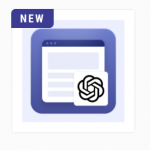Magento 2 iPaaS Systems & Cloud Automation Platforms
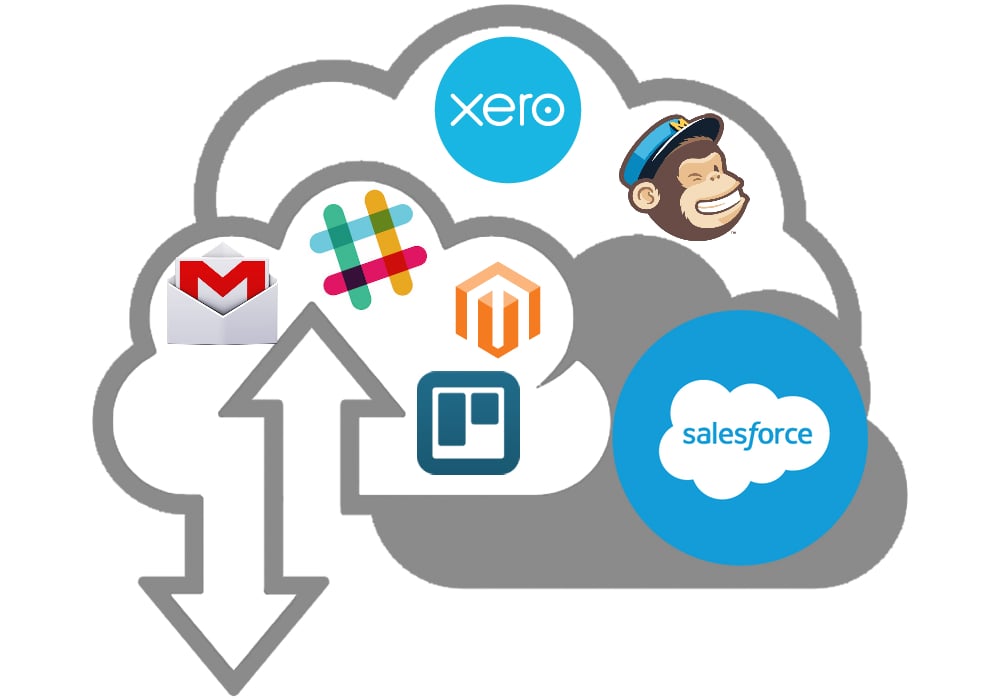
The future is in the cloud and you cannot deny this. More and more services provide cloud integration allowing customers to connect their business systems to other third-party platforms via the cloud. Even our Improved Import & Export Magento 2 module offers the ability to integrate your ecommerce store with any third party system via Dropbox. Furthermore, there are some official predictions that inform us about a huge growth of public cloud services in terms of investments. It means that the old enterprise service bus (ESB) approach will become less popular within the next few years. But what will take its place? Here at Firebear, we know for sure that the new generation of integration tools is already here: meet the Integration Platform as a Service approach. In the following post, we describe its core nuances as well as shed light on Magento 2 iPaaS systems and cloud automation platforms. Also, check our article about Magento 2 webhooks.

But before going any further, let’s tell a few words about a more common way to integrate Magento 2 with third-party platforms and services. As we’ve just mentioned, you can use our Improved Import and Export Magento 2 extension to achieve this goal. The module allows transferring data between your e-commerce store and other systems in several ways. First of all, you can rely on a standard file transfer via CSV, XML, and TXT formats. Next, the Improved Import & Export Magento 2 module provides the ability to move data between your store and any third-party service via Google Sheets. Alternatively, it leverages API connection between two platforms. As a result, you turn your website into a central hub and the backend – into a control room.
Multiple file sources are supported as well. As we’ve just mentioned, the integration between Magento 2 and the selected service can be established via Dropbox. Other supported ways include FTP and SFTP connections. At the same time, you can import data using the direct URL. Hit the following link to find out how to synchronise Magento 2 with any online marketplace to import and export product data. But let’s return to the main topic of our article – iPaaS.
iPaaS and ESB are like gas and LED lamps: they have the same goal, but the absolutely different realisation, technology, resource consumption, and influence on the surrounding world. Although you might have thought we went too far with such an amplified comparison, the difference is really huge. Unlike ESB, the iPaaS model doesn’t require either on-premises hardware or middleware nor software. Tools are delivered right from the public cloud (ESB requires tons of manual work while installing and managing new software and sometimes even hardware). And if previously these tools were responsible only for some relatively easy tasks, now their performance is rapidly growing. You can still find articles describing ESB as a technology used by big enterprises, and iPaaS – as a system popular among small merchants. This is still true to some extent, but the modern world is no longer a constant. Its only permanent feature is unstoppable development, so the balance between iPaaS and ESB solutions is changing right in front of your eyes.
The initial goal of ESB was to integrate complex IT systems with sophisticated architecture often combining on-premises and legacy components of the enterprise. On the other hand, iPaaS was responsible for more lightweight integrations and flexible real-time apps. But this was just the beginning of the cloud epoch. Today, cloud solutions are gaining more and more power along with additional flexibility. Sooner rather than later they will get the same performance as ESB along with other advantages of enterprise service bus installations providing a set of unique features and opportunities. Seems intriguing, but let’s take a look at some other nuances.
For instance, scalability is considered to be another major point of difference between iPaaS and ESB. While vertical scalability is typical for ESB (because this integration type appeared in the era of ERP), iPaaS is characterized as a better solution for solving tasks related to integration with third parties and SaaS solutions. In other words, it creates perfect conditions for horizontal scalability. Don’t forget, that iPaaS is lightweight and flexible (and soon will be very powerful); therefore, it enables you to connect cloud applications with various business systems rapidly and without headaches.
It is also necessary to describe such aspect of iPaaS as multi-tenancy as well as compare it with the appropriate feature of ESB. If you are not familiar with what a multi-tenant architecture is, here is a brief description: it is a single software instance that runs on a single server serving multiple users and even user groups. Imagine a company and a software which is installed on a single server and used by all company departments. Such software illustrates multi-tenancy. And due to the aforementioned features and functionality limitations caused by a complex architecture, ESB solutions usually cannot be multi-tenant. They consume lots of resources, and support for multi-tenancy will increase the load even more. And the situation with iPaaS is opposite: users have no barriers in sharing a single instance. As a result redundancies in integration processes are reduced. Furthermore, this is also true of administrative and infrastructure costs caused by integration.
And don’t forget about ad hoc solutions and the necessity to decide, choose, and use applications rapidly. In modern companies, lots of tasks that were previously within the competence of the IT department must be solved by other departments or even individuals. In the business environment, the possibility to achieve this goal with the minimum resource consumption is vital. And due to horizontal scalability, flexibility, and relative simplicity, iPaaS perfectly solves this task.
Unfortunately, traditional ESB solutions cannot integrate your business system with SaaS easily. They heavily rely on complex middleware technologies and the MOM architecture which is not used by SaaS. That’s why the integration requires lots of work to be done. But there are so called “cloud ESBs” that utilize the same lightweight protocols as iPaaS. In case of Integration Platform as a Service, JSON and API connectors are used. This lightweight solutions are best suited for SaaS integration. Therefore, we can talk about the influence of iPaaS on ESB and the complementing technologies that still pass through the competition between each other increasing the usability of both.
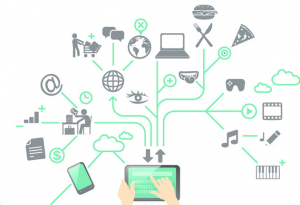 It is also necessary to mention the Internet of Things in our post. While this trend is far from being a part of everyone’s daily routine, it is constantly growing and one day more and more businesses will rely on IoT. But does the traditional ESB approach provide the ability to run the IoT integration? Definitely, not. The problem is in its vertical scalability. So, as you might have already guessed, iPaaS seccours. Being based on the sheer volume of connected devices, IoT integration requires high horizontal scalability, external integration, lightweight connectivity, low latency, and real-time connection – factors that make iPaaS perfectly suitable for integrating the technology into every business.
It is also necessary to mention the Internet of Things in our post. While this trend is far from being a part of everyone’s daily routine, it is constantly growing and one day more and more businesses will rely on IoT. But does the traditional ESB approach provide the ability to run the IoT integration? Definitely, not. The problem is in its vertical scalability. So, as you might have already guessed, iPaaS seccours. Being based on the sheer volume of connected devices, IoT integration requires high horizontal scalability, external integration, lightweight connectivity, low latency, and real-time connection – factors that make iPaaS perfectly suitable for integrating the technology into every business.
Of course, it is not good to idealize iPaaS creating an image of a technology dominating over ESB. The latest still has some advantages. For instance, it is still more suitable for complex organizational systems and internal architectures: it isn’t cost effective to use iPaaS for holding complex internal systems together. Thus, iPaaS and ESB are often combined to provide the maximum efficiency.
Table of contents
Core iPaaS Features
Below, you can see a list of core iPaaS features that describe its business other other technologies:
- Business apps integration:
- No coding is required (usually);
- Absolutely different tools can be combined together (connect Magento 2 to Xero, Slack, Trello, or whatever else);
- Synchronization goes in all directions.
- Data connection between different systems:
- Bidirectional data flow (for instance, to and from your Magento 2 store);
- All business applications are always updated;
- Backups are usually created, so you can restore the whole system to its previous state within just a few clicks.
- Workflow automation
-
- Specify triggers that will launch certain actions;
- Make everyday processes fully automated and save time for solving more important tasks;
- Let your team concentrate on more vital aspects of your business.
Now, when you know what iPaaS is and how iPaaS benefits over ESB, we can return to our main topic – Magento 2. Below, we’ve gathered the best Magento 2 iPaaS systems and Magento 2 online automation tools that can be used for both versions of our favourite ecommerce platform. Some solutions already provide Magento 2 integration, while the others are only working on the support, offering multiple connections for Magento 1.
Magento 2 iPaaS Solutions & Cloud Automation Platforms
DSYNC
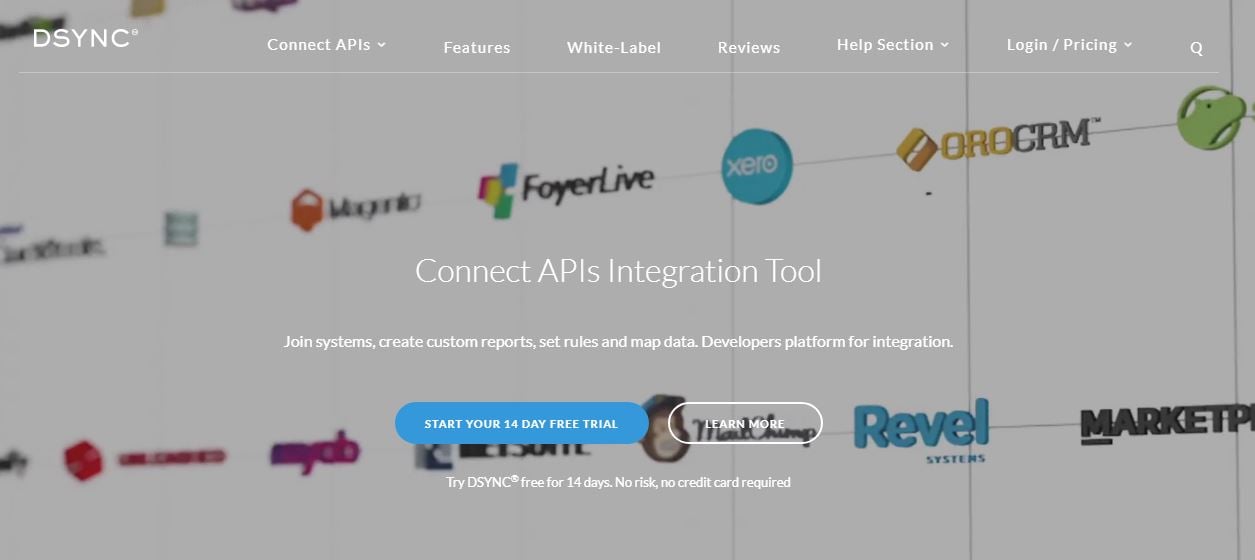
DSYNC is a robust APIs integration tool that enables you to create complex connections combining several platforms together. Besides, it allows creating custom reports, setting rules, and mapping data. DSYNC is a number one developers platform for integration that offers the Magento 2 iPaaS technology symbiosis.
By using the platform, you get a perfect opportunity to connect any available rest API in the easiest and most secure way. Simply integrate your website, POS, ERP, inventory, CMS, and accounting system with each other via the DSYNC Magento 2 iPaaS system. Note that no coding skills are required for combining, transforming, and mapping everything together. With DSYNC, you get a dynamic synchronized inventory for establishing a secure connection between platforms. To simplify data processing and make it more precise, the platform also offers a filter. Thus, you get a unique cloud integration opportunities with the DSYNC iPaaS system that cover Magento needs. Here is how a connection looks:
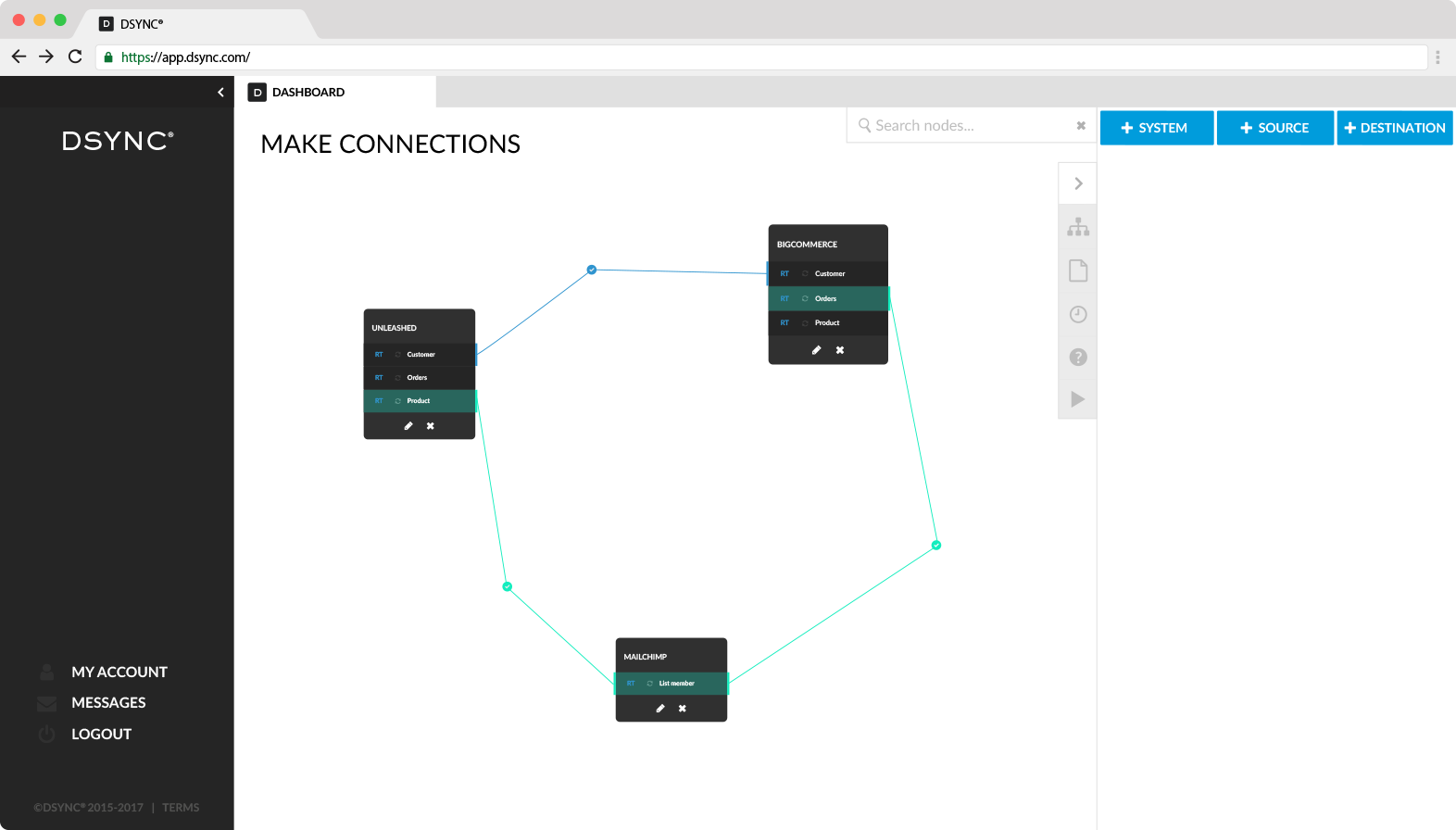
And this is an illustration of mapping:
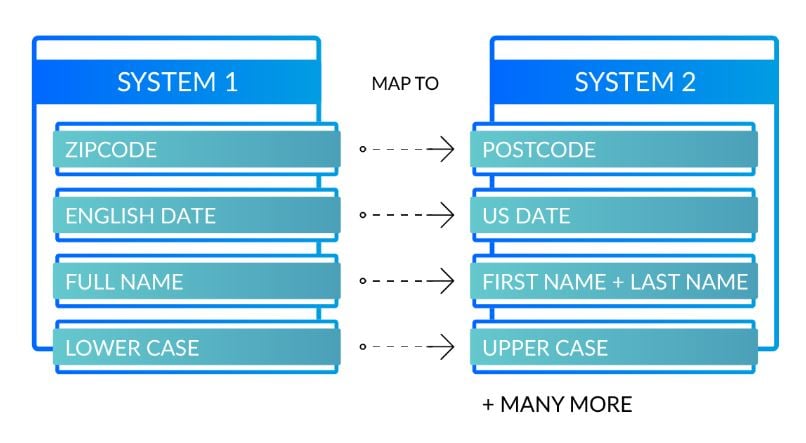
Being developed with customers in mind, the DSYNC Magento 2 iPaaS platform offers a user-friendly web-based dashboard designed to map, control, and set secure cross-platform connections seamlessly. You can create any combination of on premises processes, apps, and platforms bringing costs down. Just check the following features that describe DSYNC even more:
- Two way synchronization with no programming;
-
Data mapping;
-
Unified view of all integrations in a hub;
-
Transformation rules to control data flow;
-
The same data trigger to update multiple systems simultaneously;
-
Support for multiple formats, methods, and data types: XML, JSON, FTP, Webservice, etc.
Now, let’s focus on Magento specific features of the DSYNC iPaaS. Create a customer account and leverage iPaaS with your ecommerce store. The platform can help you connect Magento 2 to your favorite apps and third-party solutions designed to improve shipping, inventory, POS, ERP, email marketing, etc.
The current Magento 2 iPaaS system integration allows connecting your ecommerce store to:
- – point of sale on your iPad;
- and – accounting and enterprise resource planning tools for managing every aspect of your business;
- – a set of sales management tools;
- – tools for managing all your interactions with customers;
- – retail management software for inventory, accounting, CRM, POS, purchasing and all sales channels;
- – robust accounting software;
- – online accounting platform for small businesses;
- – another reliable accounting software;
- – open source customer management platform;
- – connected inventory with end to end visibility of your supply chain;
- CSVs – DSYNC Magento 2 iPaaS supports CSV import/export;
- – email marketing service;
- – cloud-based platform to power a logistics network;
- – multi-carrier shipping API and dashboard;
- Loyalty programs and many other services.
And you can always create a new Magento 2 iPaaS system integration using the detailed DSYNC SDK documentation. For further information, go here:
As for pricing, you can use DSYNC for 14 days for free. A basic developers account costs $25 per month. If you don’t want to sort out the integration by your own, the cheapest plan starts from $100 per month. For further information, follow this link:
Elastic.io
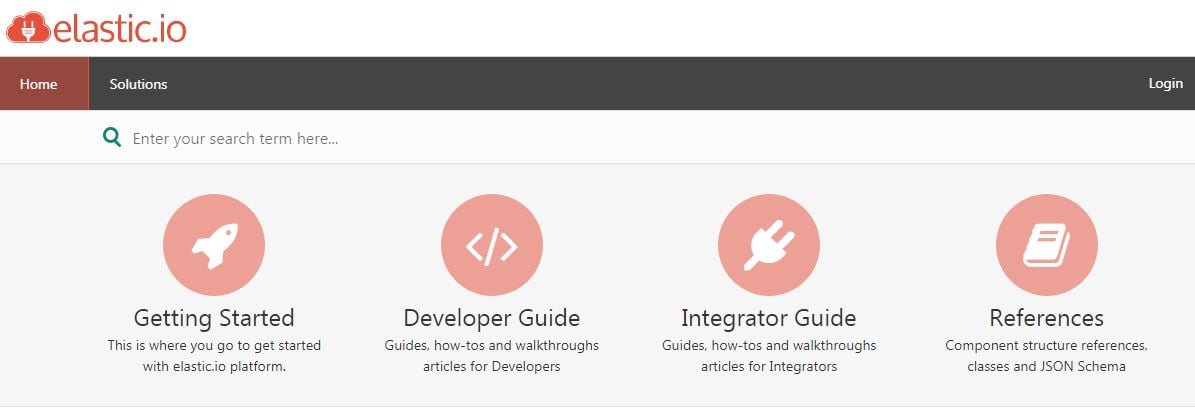
Another iPaaS system that allows accelerating your digital transformation is Elastic.io. It is a cloud-based integration platform that offers a preconfigured connectors, which can be leveraged to integrate your Magento storefront to various cloud and on-premises software applications. ERP, CRM, and ecommerce platforms integration are offered by Elastic.io.
By choosing this service, you not only get a robust Magento iPaaS solution, but also join a place where experts provide advices on tools that would perfectly meet your ecommerce needs. Feel free to choose the best applications and integrate them with your Magento website. Even the Magento iPaaS Oracle integration is possible. Note that you can switch to other solutions if necessary in the future. This is the example of the Elastic.io dashboard:
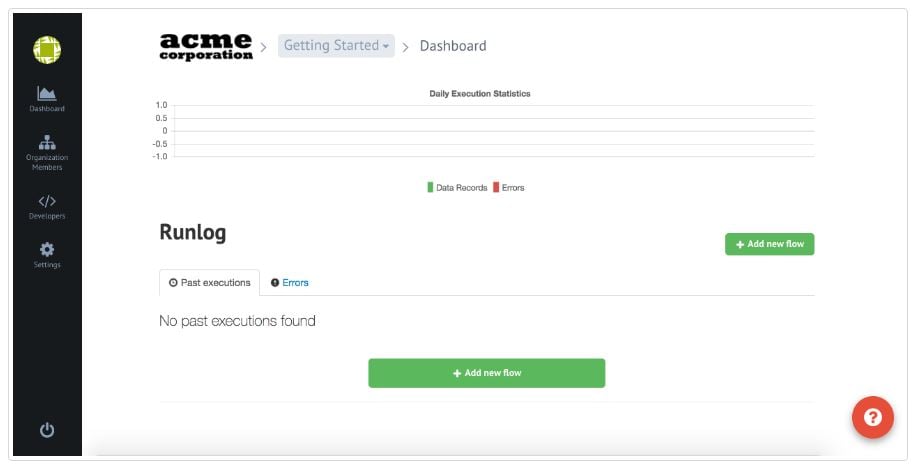
Elastic.io offers 4 cloud types:
- Public Cloud;
- Private Cloud;
- Hybrid Cloud;
- Multi Cloud.
Thus, the service satisfies all possible ecommerce needs and requirements. to discover how to connect your Magento website to the Elastic.io iPaaS system, go here:
Add new Magento account as follows:
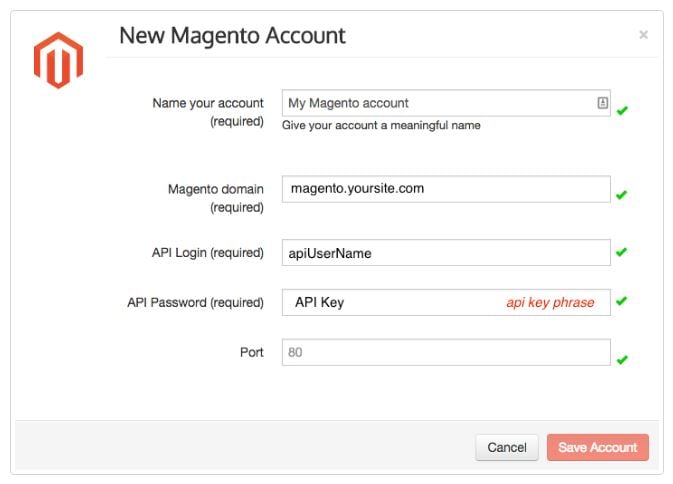
Note that the Magento 2 support will be added soon!
In comparison to DSYNC, Elastic.io is much more expensive. The cheapest plan starts from €499 per month. You can find other plans and their features here:
Celigo
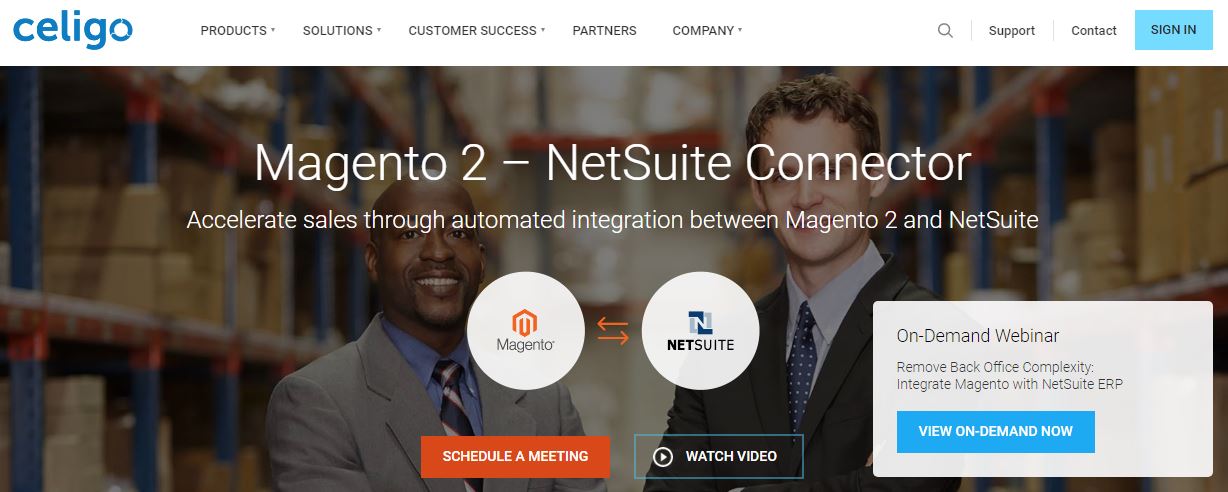
Another reliable Magento iPaaS service is called Celigo. With this platform, you can not only deploy and customize the existing solutions, but also create new ones. Celigo offers several services and tools that essentially simplify the integration process.
For instance, there is the Integrator.io connector – an ultimate tool for integrating anything with anything. You can easily set-up automated dataflows between cloud apps and files as well as upload data to all your cloud applications with ease.
There are also SmartConnectors available with the platform – prebuilt integrations for popular cloud apps built on top of integrator.io. They are easily deployed and at the same time highly configurable.
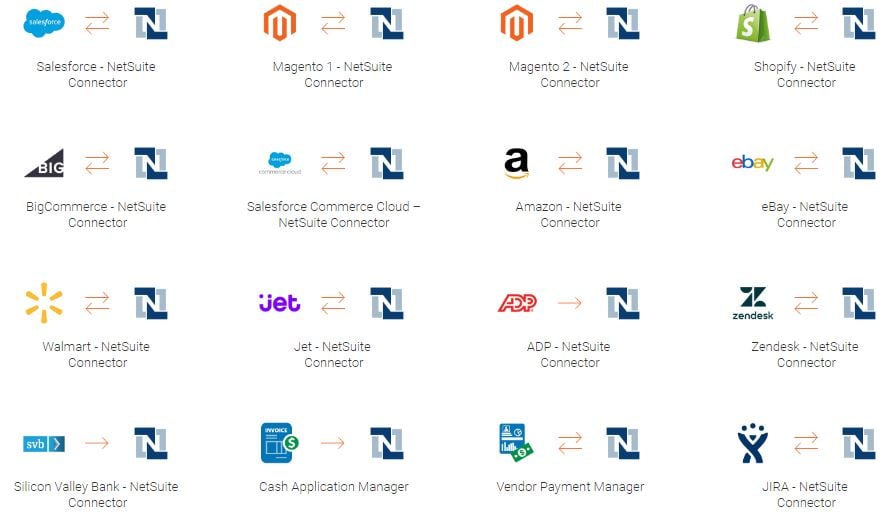
Celigo Productivity Apps are also worth mentioning. The Excel SmartClient is responsible for integrating Excel with NetSuite or Salesforce. As a result, you get all Excel’s data manipulation functions. Besides, there is CloudExtend for G Suite that integrates NetSuite with the following Google services: Gmail, Google Drive, Calendar, etc. You can not only view NetSuite records from within Gmail, but also edit them right there!
There is Magento 2 NetSuite Connector in the portfolio of Celigo that allows integrating Magento 2 with NetSuite ERP. As a result, you get timely order fulfillment, accurate product availability, and real-time statuses of various entities. Additional development or IT support are no longer necessary! For further information, follow this link:
As for prices, they depend on a product you choose. For example, the minimum price of the aforementioned Magento 2 iPaaS system connector starts from $250. As for Integrator, it is more expensive – $500 per month.
MuleSoft and Anypoint Platform
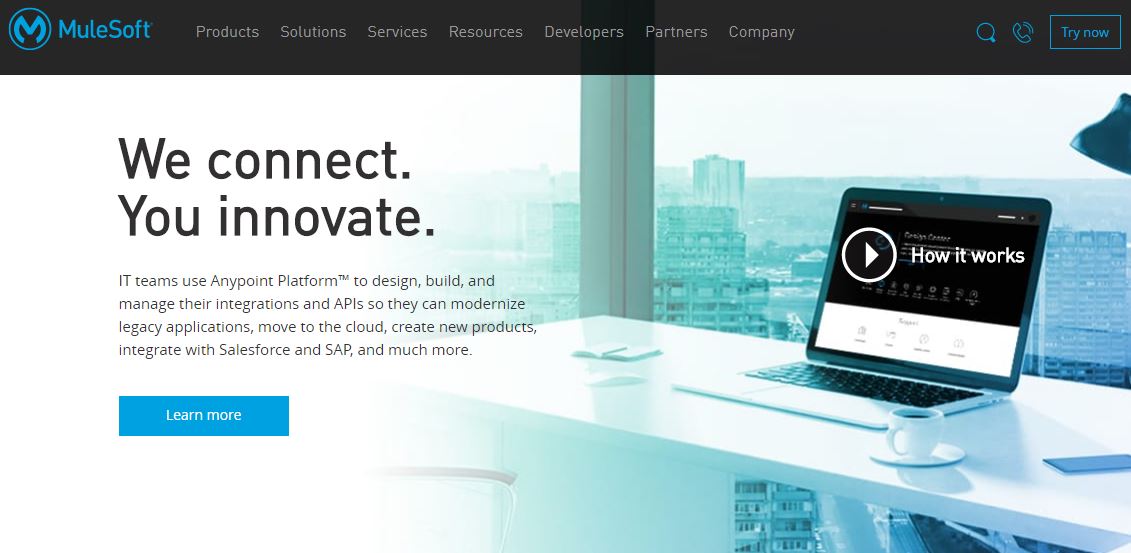
MuleSoft offers a reliable service for integrating your online business with other platforms using iPaaS. You can connect apps, data, and devices. Furthermore, the service supports both on-premises and in the cloud solutions utilizing an API-led approach. Revamp your SOA infrastructure easily by updating legacy systems, proprietary platforms, and and their connections. Use public or private cloud infrastructure and prioritize adoption of SaaS apps with the MuleSoft Magento 2 iPaaS system. Core features:
- Connect all your apps and data;
- Create enterprise-grade APIs using RAML;
- Use connectors, templates, examples, and APIs to increase productivity;
- Mule runtime to deploy anywhere.
The platform offers more than 120 connectors, including Mule ESB, CloudHub iPaaS, and API Manager. Besides, there is a tool for Magento iPaaS integration – Mule Magento Connector. You can find more information about the connector here:
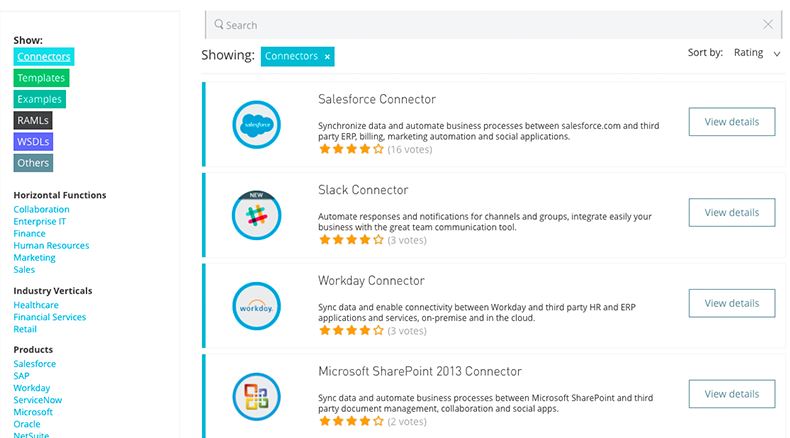
You can get the connector here for free: .
Also check the official website of the Magento 2 iPaaS system:
Informatica
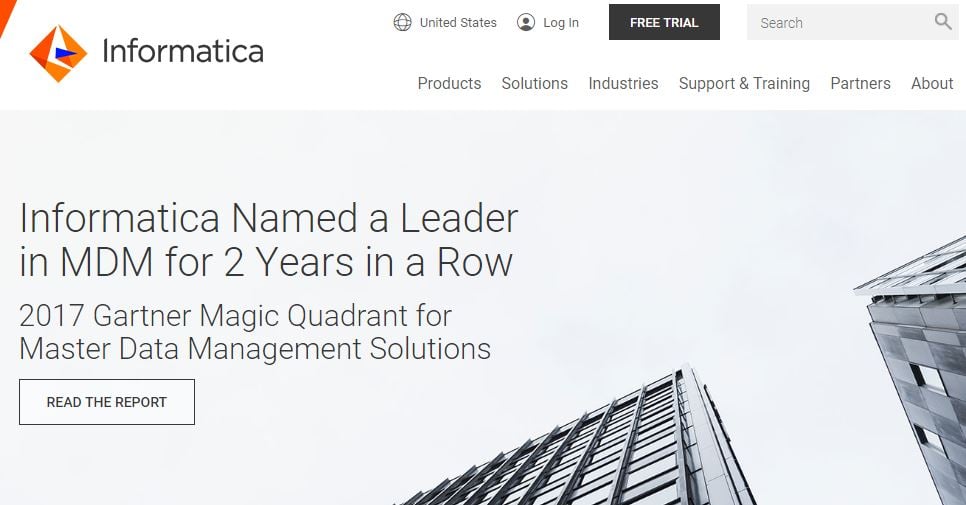
Informatica is a reliable iPaaS platform that offers intelligent:
- Big Data;
- Cloud Services;
- Data Integration;
- Data Quality;
- MDM (Master Data Management);
- Data Security.
The company is among leaders in terms of customer loyalty (11 years in business) and cloud data management (more that 1 trillion transactions per month). Besides, it offers a global network of SI, ISV, OEM, and on demand partners. You can read more about Informatica here:
The Informatica Magento connector offers an absolutely new level of back-office connectivity. With the help of this Magento 2 iPaaS system, you can easily integrate your store with various backend systems and ERP platforms, including such popular products as Microsoft, NetSuite, SAP, and Epicor. As a result, the tool essentially simplifies management of your storefronts, shopping carts, inventory, and customers. You can freely use mapping:
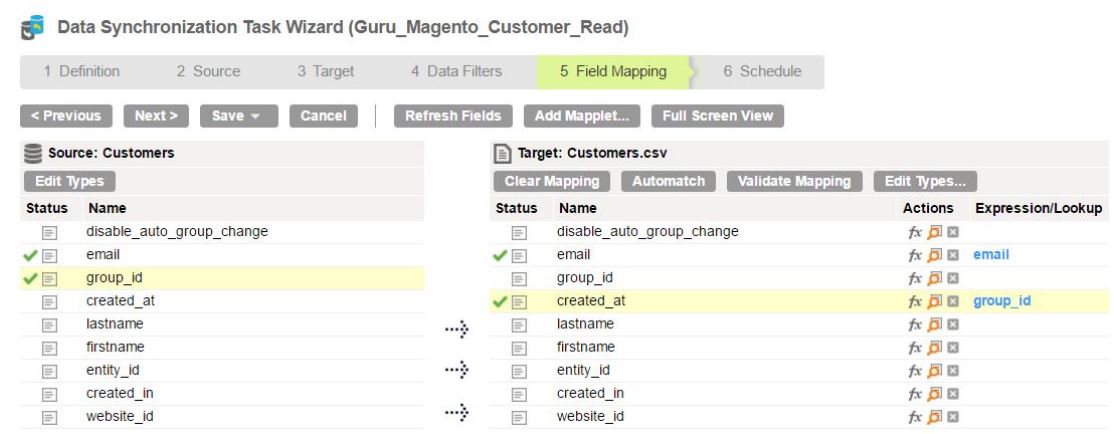
The Magento 2 iPaaS platform utilizes Magento APIs used by the system in such processes as stock management, invoicing, product management, etc. Consequently, you can integrate and automate everyday business routine with other apps. For further information, follow this link:
Nova Module
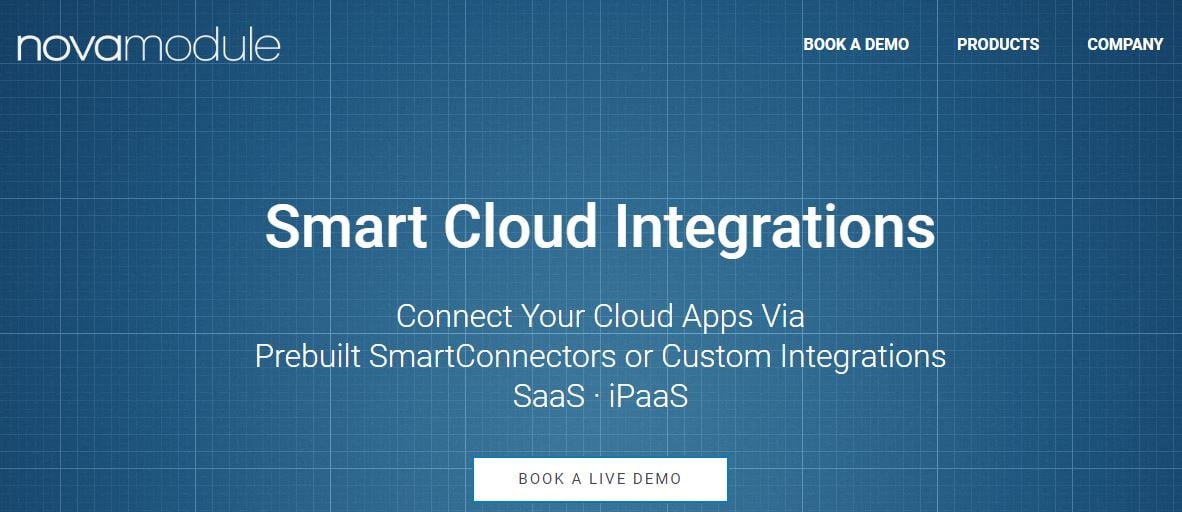
Nova Module is a solution built on Celigo’s integrator.io. Thus, you get a modern iPaaS with a unique set of features. Sounds weird that there is a platform based on a tool produced by another company, especially in a relatively new niche, but the paste of modern ecommerce is extremely high, so all new useful inventions are fully leveraged by the ecosystem.
The tool allows integrating both Magento 2 and 1, Shopify, BigCommerce, WooCommerce with NetSuite and then with eBay, Amazon, Walmart, Sears, Newegg, Rakuten, and Jet.com. Such comparison sites as Google Shopping, Nextag, Facebook Ads, and Bing Ads are supported as well, so you can effortlessly connect your Magento 2 website to them in order to leverage a new sales channel.
Another way to improve the efficiency of your ecommerce routine is to get your order data, items, fulfillments, inventory, and purchase orders synchronized between various platforms. It is a mandatory part of the integration, otherwise the synchronization should be performed manually, which not only sounds outdated but also consumes tons on time.
And don’t forget that with the Nova Module Magento 2 iPaaS systems you will fully leverage NetSuite and DCL integration and get the ability to connect your ShipStation account to the business.
In order to integrate all the aforementioned benefits into your Magento 2 store, you need a special connector. You can find it on the official Nova Module website. The price of the Magento 2 NetSuite Connector stars from $250 per month. For further information about this Magento 2 iPaaS technology, follow this link:
Dell Boomi
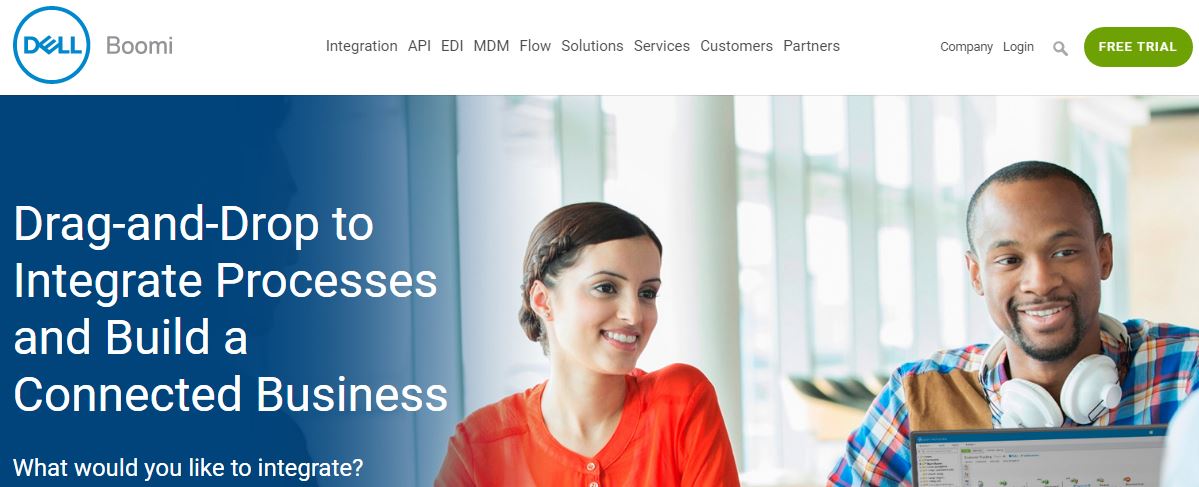
Dell Boomi is an enterprise Integration Platform as a Service which has a user-friendly interface. You simply need to drag-and-drop to integrate various processes together and build a connected business. As in case of other iPaaS, no hardware or software is needed. Besides, you get fully automated upgrades, top notch security, and wide scalability. Dell Boomi connects over 200 apps, 1,000 endpoints, and enables 5,000 businesses. Two core integrations are SalesForce and NetSuite.
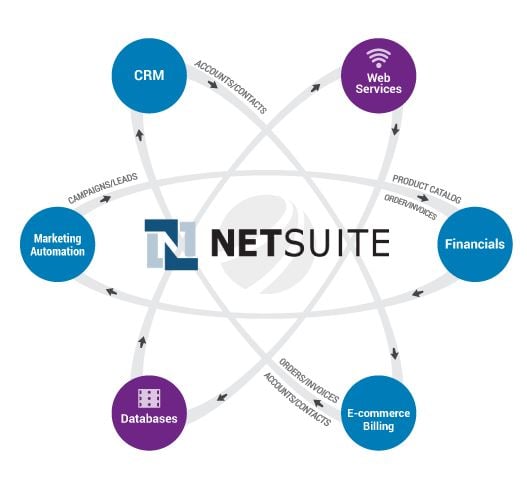
Dell Boomi works with a 100% native cloud as well as offers accelerated time-to-value and unprecedented ease of use with point-and-click tools and pre-built connectors. Improve the way you work in such areas as sales, finances, human resources, and industries with this Magento 2 iPaaS system.
As for the Magento connector, it dramatically simplifies the way you work with the Magento platform by adding an extra layer of convenience. The Magento 2 iPaaS systems allows you to set up the Magento connector to move data to both directions – into and out of your Magento ecommerce website. You can fully leverage the tool for both platform versions as well as all possible editions. Combine on-premise applications and legacy systems (including on demand or SaaS-based apps) to increase your ecommerce performance. The Magento connector by Dell Boomi utilizes the Magento Web Service REST API v1. This standard uses the JSON format, so profiles are managed in JSON as well. For further information, follow this link:
APPSeCONNECT
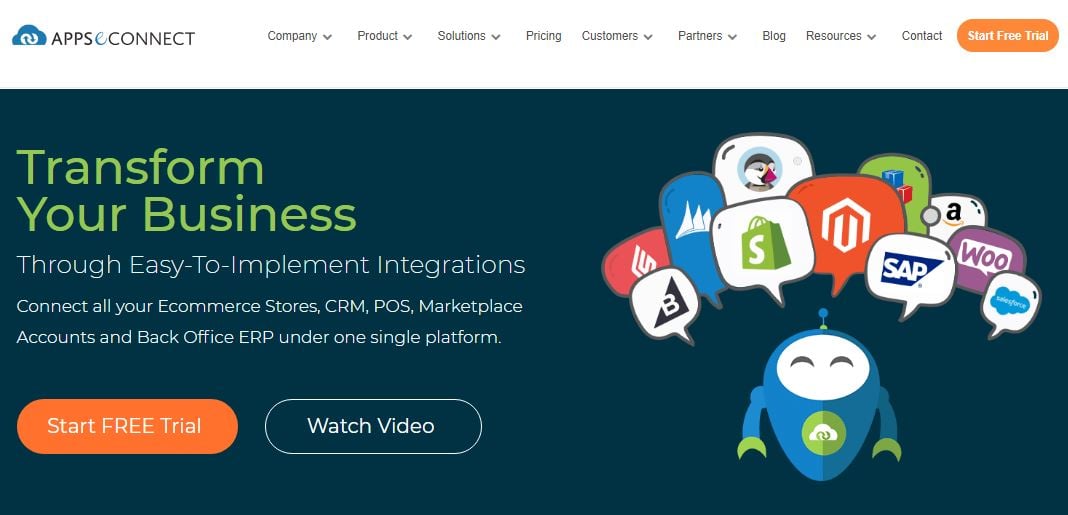
Being a hybrid integration platform, APPSeCONNECT provides comprehensive integration solution designed to increase the productivity and profitability of your ecommerce business, including Magento. The platform enables businesses to connect various apps together, creating a huge ecommerce monolith.
Originally, there were two different products, SBOeCONNECT and NAVeCONNECT, which evolved into one – APPSeCONNECT. Thus, the platform received features of two different tools and now it can easily combine various ERP and ecommerce solutions. Furthermore, the platform offers on premise integration as well as supports such popular ecommerce apps and platforms as SAP Business One, Magento and PrestaShop, Dynamics NAV, Ebay and Amazon, etc.
It is also necessary to mention that APPSeCONNECT has a “hybrid” nature. It means that the Magento 2 iPaaS system includes both on premise and cloud integration approaches. Thus, it introduces relatively wide ecommerce opportunities. These are several popular connections:
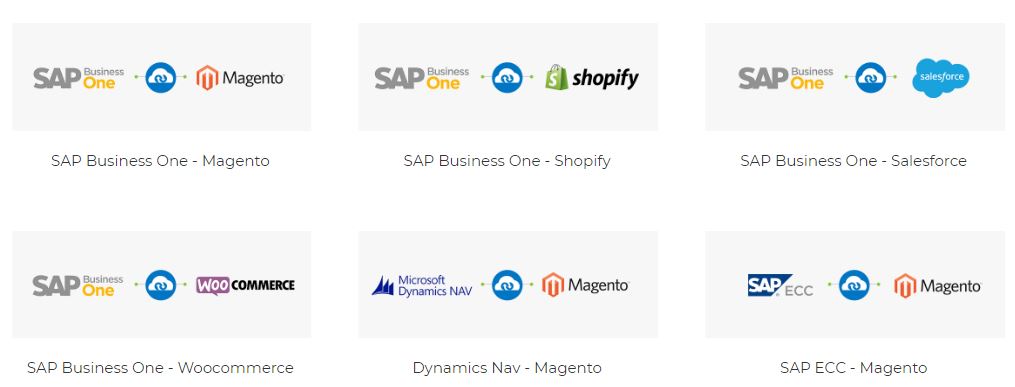
And if you are a developer, you can always rely on the company’s SDK, which is available publicly. APPSeCONNECT is thinking about the community, so enthusiasts of all kind can make the platform better by developing any new integrations.
Besides, all key processes that run on APPSeCONNECT are fully automated. You not only get a user-friendly website, but also eliminate the need to perform some routine tasks. Simply choose the APPSeCONNECT iPaaS solution, and there won’t be any reason to worry about real time data exchange across various business apps. The platform will do everything instead of you connecting the best in class industry apps.
The iPaaS solution combines more than 500 customers and 120 partners all over the world. And you can always join them in your attempts to combine multiple business applications and let them work as a single entity. At APPSeCONNECT, they call this IoA or the Internet of Applications, so iPaaS is useful not only for the Internet of Things. You can discover more facts about APPSeCONNECT here:
Now, let’s tell a few worts about the Magento 2 iPaaS technology. On the appropriate page, you can discover that the company helps small and medium-sized Magento enterprises automate and streamline their businesses by connecting ecommerce websites to various third-party applications via smart integrations. We have our own thoughts that will be illustrated by a new article soon, but what about big Magento enterprises? This information is absent, but we don’t think that APPSeCONNECT will reject the request if a big company will ask for help.
The benefits of integration are quite common, but let’s describe them once again. First of all, you will save lots of time and effort by choosing the Magento iPaas system to integrate your store with other platforms. It will seamlessly connect your Magento 2 website to business-critical apps saving a huge amount of time and effort: the platform not only automates the integration procedure, but also makes various business processes autonomous. Since dozens or even hundreds of such processes take place in a huge business system that consists of various blocks, the usage of APPSeCONNECT iPaaS system makes sense.
As a result, you essentially boost the productivity of your company, eliminating the need for manual data entry. Furthermore, this leads to a reduced risk of errors, increased productivity, and improved quality. As a business owner, you get more time to focus on profitability and think about increasing customer satisfaction, revenue, and growth.
With the APPSeCONNECT Magento iPaaS system, you can connect your ecommerce storefront to such ERPs as SAP Business One, Microsoft Dynamics NAV, SAP ECC, and Microsoft Dynamics AX. As for CRM solutions, they only include Microsoft Dynamics CRM.
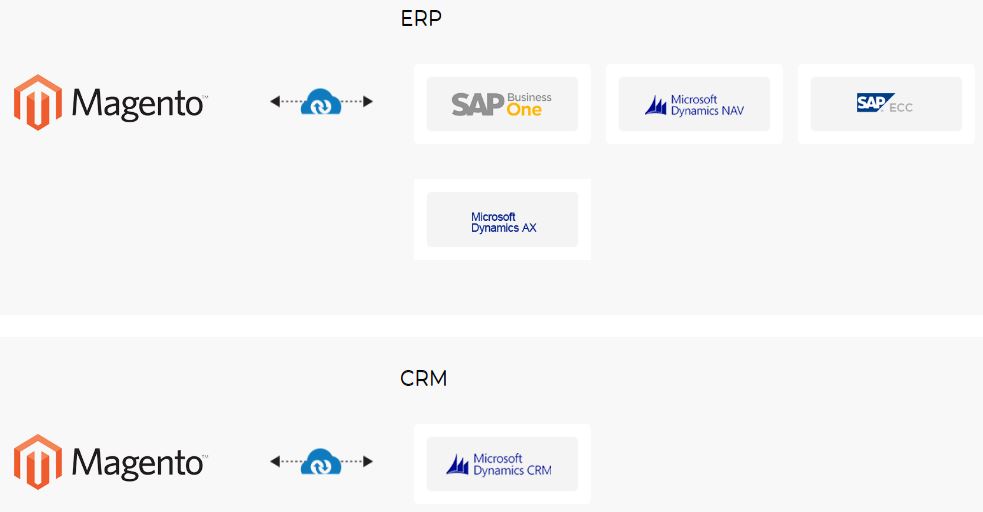
For further information, follow this link:
As for prices, APPSeCONNECT charges from $279 per month for connecting your Magento website to other platforms.
Cent IO
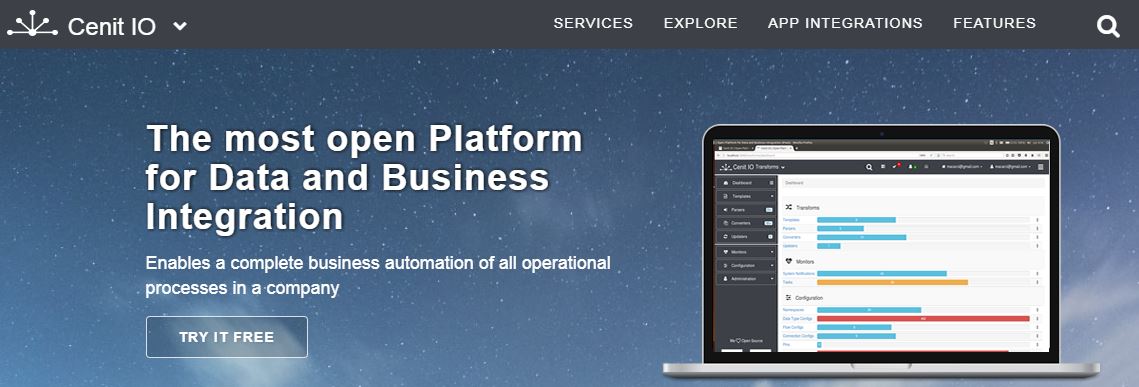
If you are looking for an open source Magento 2 iPaaS solution, pay attention to Cent IO. This platform will help you automate sales, marketing, and various business processes for free.
Become a part of the community and get all benefits of open source and free iPaaS. Launch your own server and leverage pre-built integrations to connect many populars cloud apps together. Note that Cenit IO is the most open iPaaS platform on the Internet. At the same time, it provides the same functionality as competitors allowing you to connect apps, sync data, and automate various business processes. And you don’t have to be an experienced coder to give it a go: Cent IO offers intuitive wizards, tools, and instruments designed to perform fast and smooth integration.
Currently, this open source iPaaS system offers 400+ integrations or shared collections created by the community. Thus, it covers almost all popular APIs and if any integration is missed, you can still create it from scratch. In addition to Magento, Cent.io allows connecting your business to Gmail, Slack, and Trello.
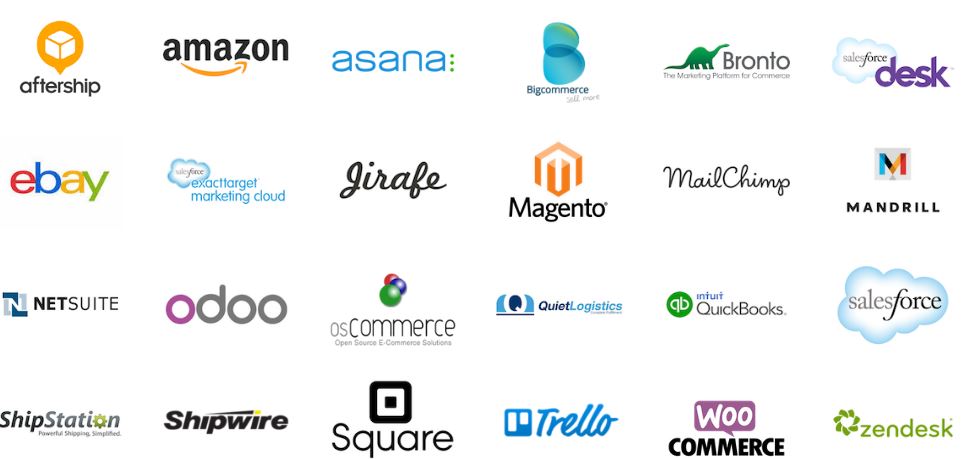
The platform that covers all your integration needs is backendless. It generates a complete REST API and a CRUD UI on the fly to manage the data. This feature is extremely useful for mobile backend and API services, essentially simplifying some routine tasks.
Routing and orchestration are also among vital features of the Cent.io Magento 2 iPaaS. The platform allows creating multistep integration flows. To achieve this goal, it composes atomic integration functionality: connection, transformation, data event, schedule, webhook and flow.
Data integration consists of such processes as data validation, transformation, mapping, and quality check. Multiple formats are supported for the exchange including JSON, XML, and ASN. Furthermore, Cent.io supports key data standards: EDIFACT, X12, and UBL. And there are communication protocol connectors for HTTP(S), FTP, SFTP, and SCP. This is a dashboard provided by the iPaaS platform:
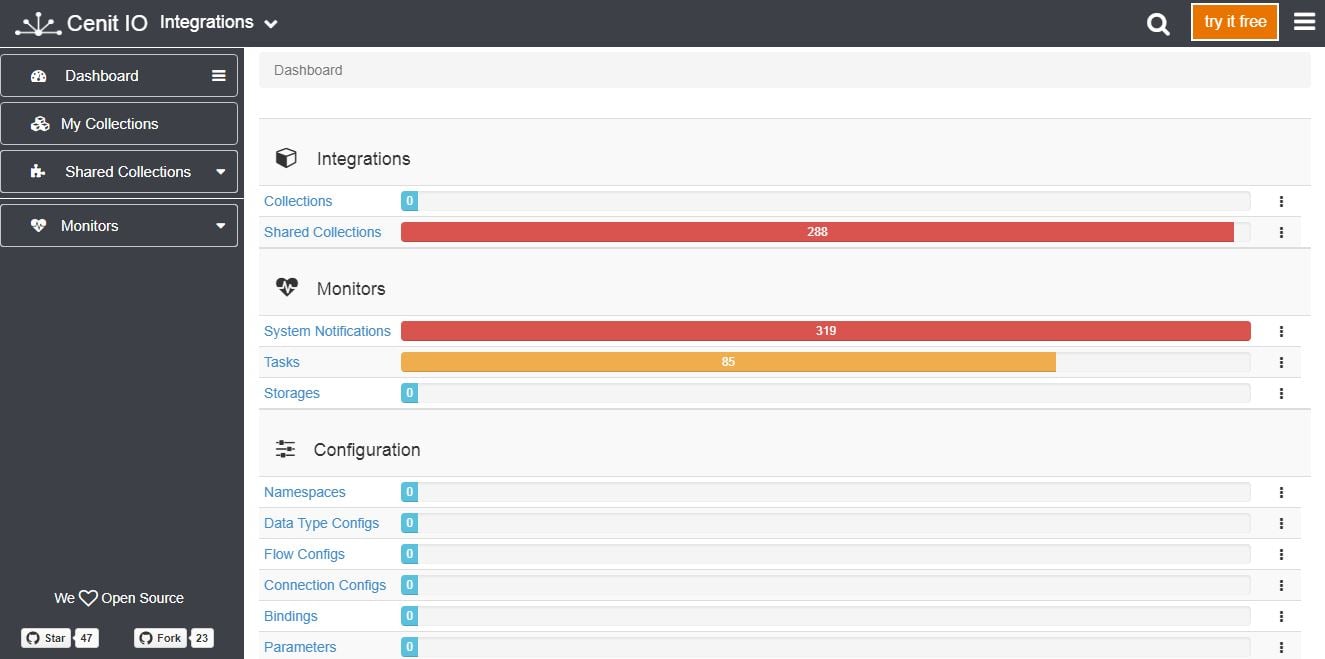
Multiple integration scenarios are possible as well. The iPaaS platform is responsible for cloud integration, publication and management of APIs, and mobile apps integration. Besides, it covers basic B2B and application and data integration needs.
Third party service integrations can be run seamlessly and without any headaches, since there is a directory for Swagger and Shared Collections. Consequently, integration settings can be easily shared. Therefore, you can find settings for connecting ERPs, fulfilment services, marketing tools, and communications within the ecosystem around this Magento 2 iPaaS system.
Multi-tenant support is among the iPaaS features as well. The platform offers logical tenant isolation in a physically shared context. Besides, you get all the necessary tools to control and manage such vital aspects as security, privacy, and compliance. Moreover, multi-tenant capabilities open new opportunities for customization of your business system and version control. You can find more information here:
As for the Cent.IO Magento iPaaS integration, it looks as follows:
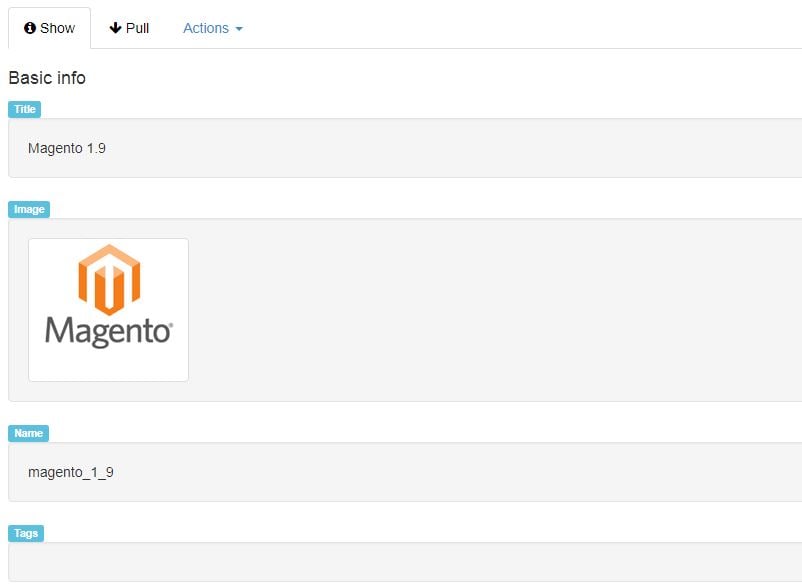
Note that the tool is open source, so you can use it out of charge.
Mothercloud
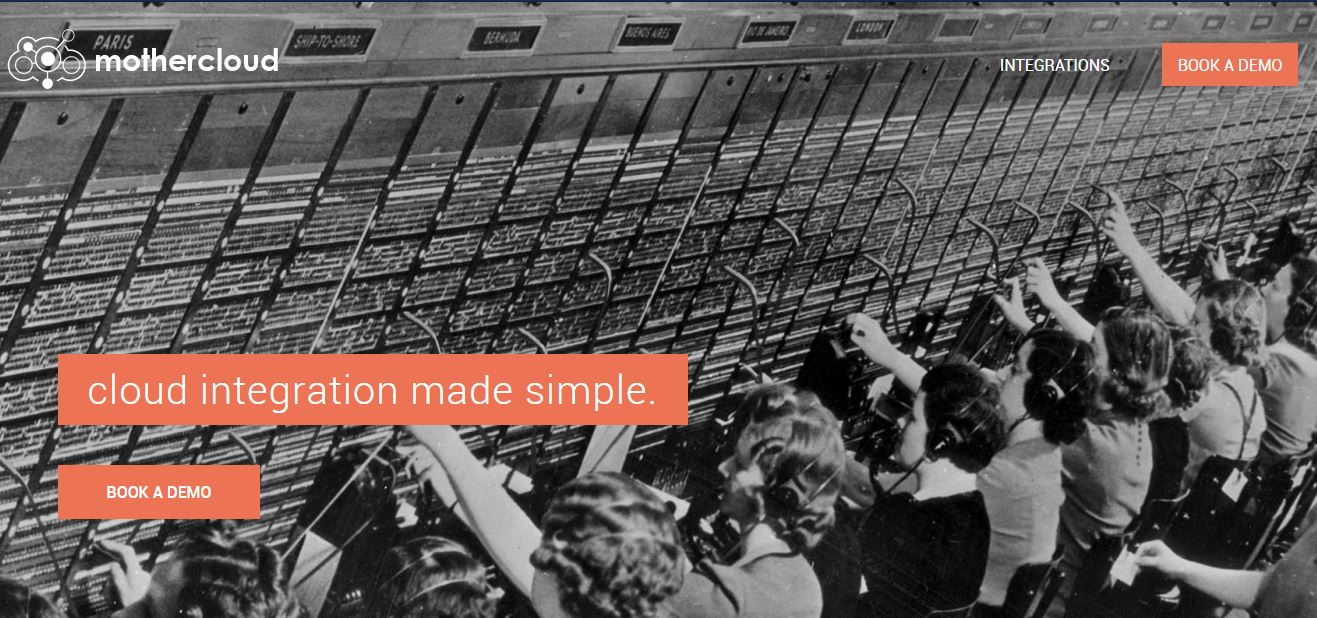
Mothercloud Magento 2 iPaaS system also offers a convenient place where you can manage all your ecommerce integrations. Pay attention to the fact that it was one of the first iPaaS services with support for Magento 2! Being a cloud based integration platform, Mothercloud provides the ability to combine and synchronise various systems together. With the iPaas solution, you can easily move data between ecommerce platforms, ERP software, accounting systems, shipping services, etc. It means that there is no need to connect your Magento 2 website to third-party services manually, since there is a better opportunity introduced by Mothercloud.
The network already contains integrators for popular ecommerce software, so you can reach the new level of automation within just a few clicks. Connect all the necessary software solutions and automate data flow between them all.
Mothercloud supports the following ecommerce platforms: Magento, WooCommerce, BigCommerce, Shopify, Opencart, and Prestshop. As for ERP and EPOS software, it include Netsuite, Volo, Brightpearl, EposNow, and Ebizmarts POS, Accounting systems included into the iPaas, are Sage One, Xero, QuickBooks, and KashFlow. And don’t forget about shipping services: DPD, MetaPack, Scurri, ShipperHQ, ShipWorks, etc.
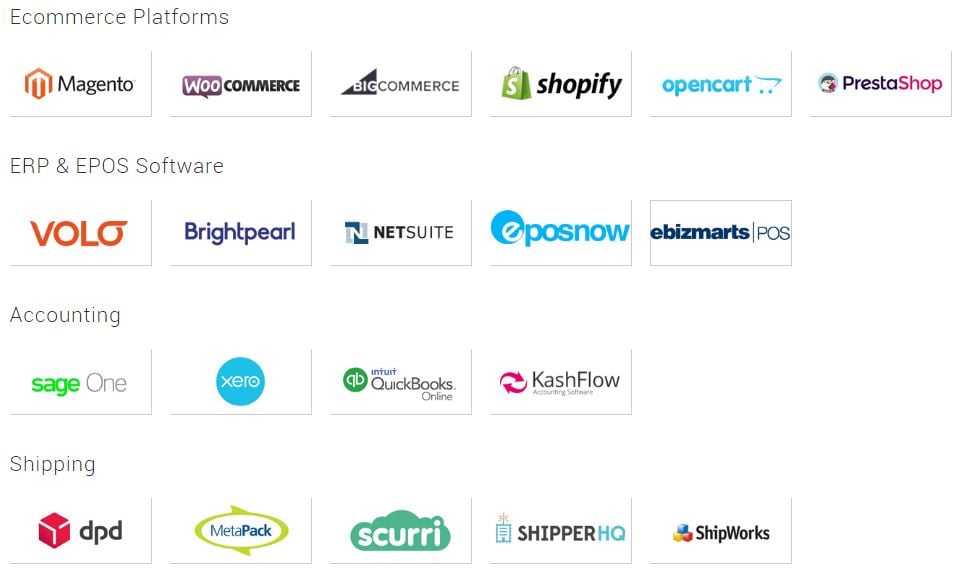
In addition to being able to automate your ecommerce workflow and synchronise data in real time, the Mothercloud iPaaS solution provides mapping, so you can connect absolutely different systems together. Easily link products by SKU or stock number. Note that you can map and synchronise such data as product titles, descriptions, images, and categories.
In order to prevent over-selling or the appearance of out of stock items, Mothercloud offers real time stock synchronisation. Furthermore, you can easily manage and update prices across websites automatically from the ERP system using this Magento 2 iPaaS system.
Customers can be updated as well. For instance, you can run all the necessary operations in your ERP or accounting system, and Mothercloud will update the appropriate data in the corresponding Magento 2 database. The automated customer update is also possible when a new order is placed. The appropriate information is added to your ERP or accounting software. Besides, the information about orders is synchronised too.
An opposite data flow is possible as well. The Mothercloud Magento 2 iPaaS allows synchronising order updates and shipments from ERP with your Magento 2 online storefront. And as you might have already guessed, the process is fully automated.
In addition, Mothercloud allows eliminating manual accounting and bookkeeping. Invoices as well as payment and contact records are created automatically, saving tons of time.
As for Magento 2 iPaaS technology integration, it provides the ability to automate dozens of workflows between your store and back office software. As mentioned above, Magento 2 is supported in addition to Magento 1. Besides, Mothercloud is multi-store and multi-currency capable. Many more Magento 2 features are supported. These are popular Magento connections:
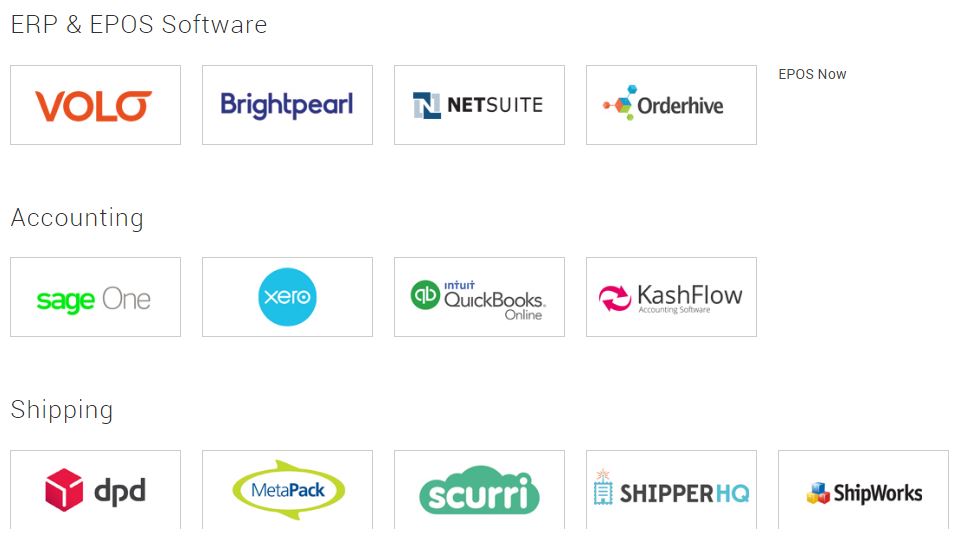
And note that this iPaaS offers simple pricing plans. the standard one starts from £49 per month. And you can easily choose one that suits your ecommerce needs the best. For further information, follow this link:
Scribe
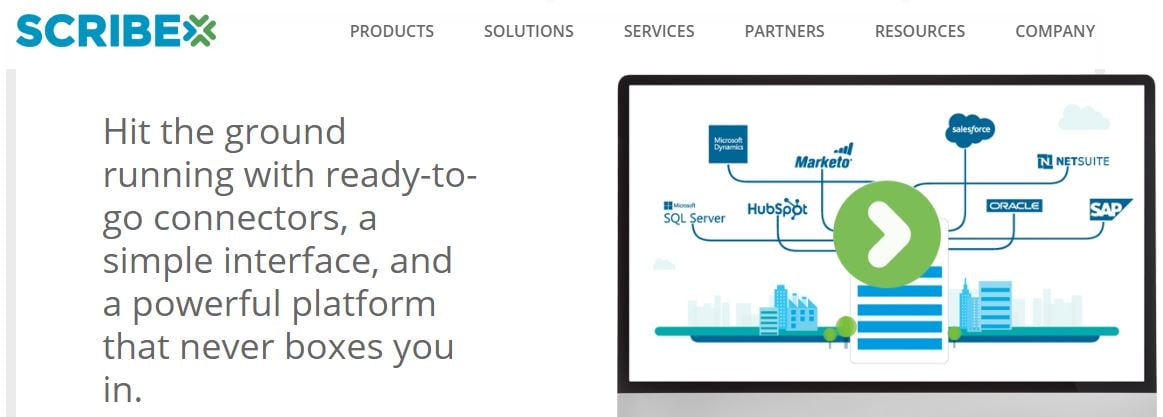
Scribe is an iPaaS and on-premises data integration platform that will help you stay connected with lots of third-party services and tools. It offers pre-built connectors for dozens of SaaS app, data services and databases, CRMs, ERPs, and marketing automation systems. Also note that the amount of integrations is always expanding. And there are tools designed to create your own solutions. These are major features of Scribe:
- ready-to-go connectors;
- simple interface;
- powerful platform;
- tool for your own integrations.
Seems like every reliable Magento 2 iPaaS provides the same functionality, so let’s try to figure out more details.
When choosing Scribe, you have to deal with a modern, cloud-based platform that essentially simplifies your daily ecommerce routine. It not only lowers time and cost of integration, but also streamline the procedure, so you no longer need advanced technical skill. The iPaaS platform acts as a single hub that gathers all your ecommerce services. All data is displayed there. And there is a single set of tools designed to transform collected information, create real-time data flows, as well as orchestrate data-based workflows. Thus, you can easily integrate all your apps deployed either on your premises or in a cloud.
Scribe’s iPaaS is a secure place for all your integrations. It not only has its own security measures, but also leverages each app’s security protocols and encryption.
Besides, it is agile allowing you to get all the necessary information updated in all connected applications. Furthermore, the same feature allows you to adapt integrations over their lifetime easily. Just watch the following video that describes one of the company’s products:
And of course, this Magento iPaaS solution is reliable. Thousands of customers are the best evidence. In addition to real-time data integration and synchronization, the service is attractive as a reliable tool for data migration and replication.
As for Scribe Magento Connector, it is described below. The most important feature of this tool is the ability to sync data between Magento and the many other applications. You connect all the platforms and solutions into the Scribe Online platform and let data flow in all directions. As a result, no manual entry of order and customer information is necessary. You not only speed up many daily routine tasks, but also dramatically reduce the amount of human errors. These are some key benefits:
- Submit orders in Magento to your back-office system;
- Move shipping details into ERP and show them to customers;
- One customer database for all systems;
- Product data syncing between inventory management systems and storefront is automated;
- Support for Magento entities;
- Support for custom objects and fields;
- OAuth authentication;
- Both on premise and cloud agents are supported!
For further information, visit this page:
Integromat
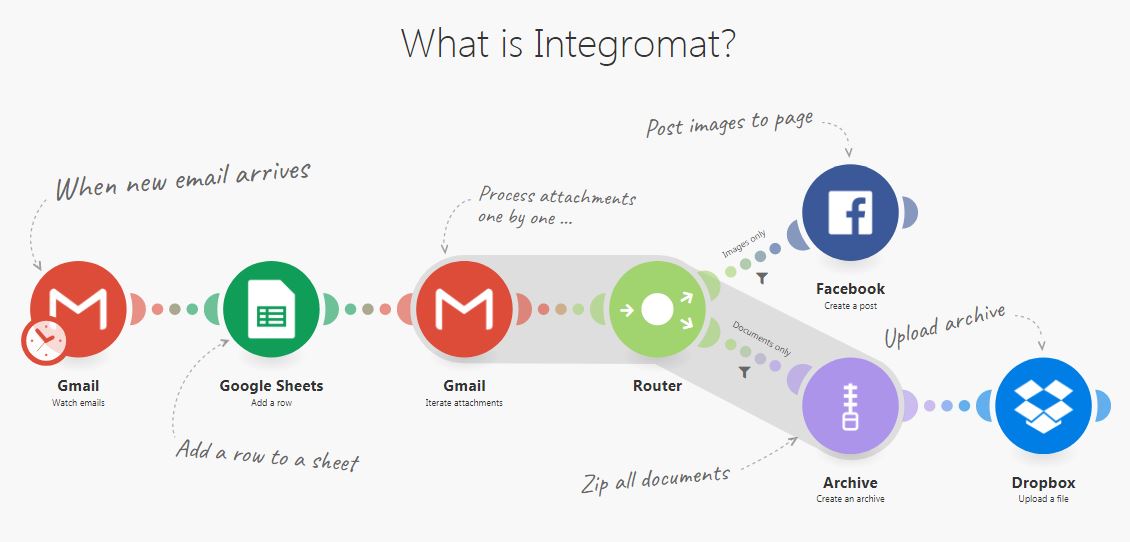
Another advanced online automation platform is Integromat. It covers really wide spectre of routine tasks replacing them with fully automated processes. And of course, the solution can be used for managing your ecommerce business within Magento. This Magento 2 online automation platform is not only capable of connecting multiple applications within one system, but is also able to transfer and transform data moving it into both directions (for instance, to and from your Magento 2 website).
There is a really huge list of supported apps and services, so you can connect nearly everything to your ecommerce website:
- Dropbox and other clouds;
- Mailing services;
- Facebook, Twitter, and other social media integrations;
- Google Drive and other Google services;
- MySQL integration;
- RSS connection;
- Slack integration;
- Trello and other task management systems;
- Webhooks;
- WooCommerce and other ecommerce platforms.
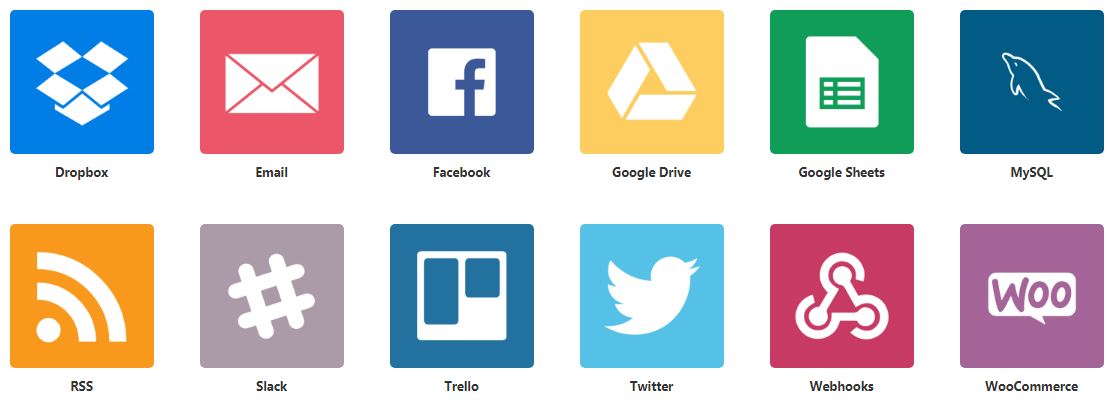
And note that there are also HTTP/SOAP and JSON modules that provide the ability to create new connections for literally every web service. And the most important aspect is that you don’t need to be a coder to create new connections.
At the same time, there is a set of tools provided by Developer Platform, so you can create your own applications.The platform provides the same tools that the team behind Integromat utilizes: robust, powerful, and easy to use.
Besides, it is necessary to tell a few words about unique Integromat features provided by this Magento iPaaS solution. You can freely use functions familiar from Excel. The platform allows you to automate many routine tasks with their help. Note that more and more functions are added on a regular basis.
Another crucial aspect of the iPaaS is the ability to specify time period for data to be processed. Thus, you can easily get information from a previous period, use real time data, or receive everything for a certain period after activation. In the video below, you can see how to use routers and filters.
Looks nice, but let’s see what Magento specific features are provided by the iPaaS.
Every Magento merchant can create any customized scenario with Integromat. There is no need to run repetitive tasks manually, since you can make your work much easier involving Integromat. For instance, the Magento 2 online automation platform allows creating Xero invoices from new Magento orders. You only activate this task and the platform does everything automatically every time a new order is created in Magento.
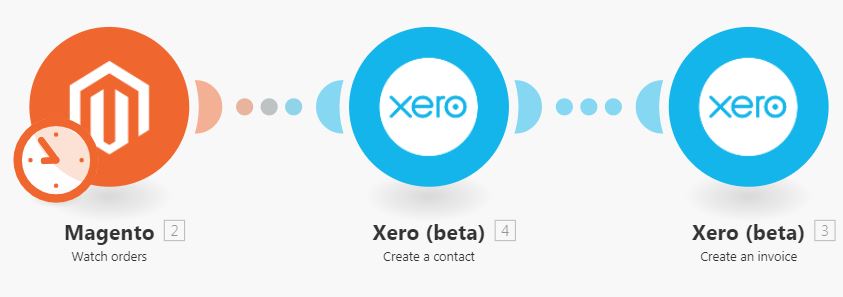
As for emails, Integromat can automatically send an email to a specified address every time a new order is created. Alternatively, it can create Trello cards or Asana tasks. Slack messages can be sent when a new Magento product is created, etc.
And there are many more examples of how you can automate your daily ecommerce routine using Integromat Magento 2 iPaaS platform. You can discover them here:
As for prices, we should emphasise this aspect of the platform as well, since you can use it for free (with some limitations, of course). The basic plan starts from 9$ per month. The most expensive one is $299 per month.
Zapier
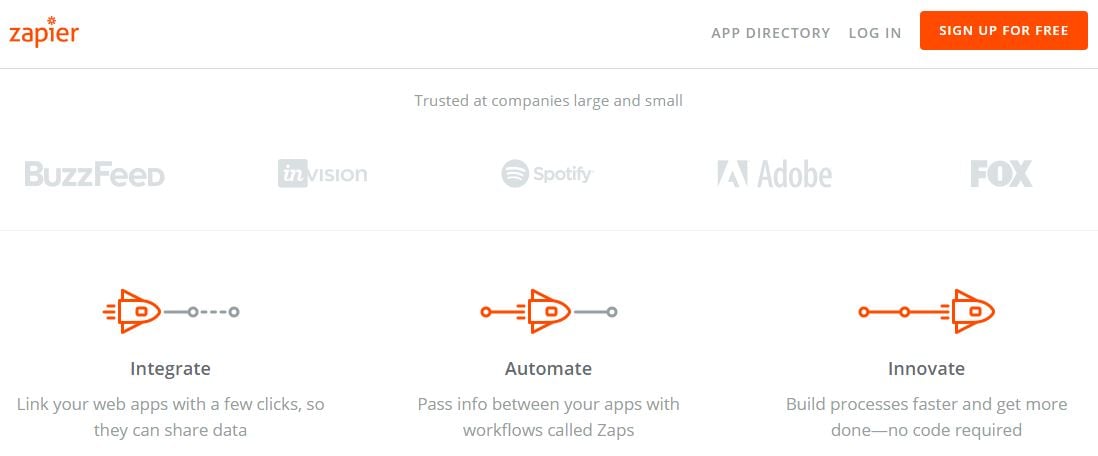
You can use Zapier to connect your business applications and automate daily routine tasks. As other iPaaS services, Zapier moves data between web apps automatically saving lots of time and effort as well as dramatically decreasing the amount of human errors.
The Zapier iPaaS allows linking your applications with just a few clicks. Next, you use Zaps – automated workflows – to move data between connected apps. No coding skills are required, so you can run the integration without any special knowledge saving lots of time. Let’s see an example of a common Zapier workflow.
You receive a new email in Gmail (trigger). The attachment is copied to Dropbox (action). The alert about a new file is sent to Slack (action).
As you can see, everything consists of triggers and linked actions. You can start workflows from any application. You pick a trigger that sets everything into motion and finishes routine tasks. Here is how a dashboard looks:
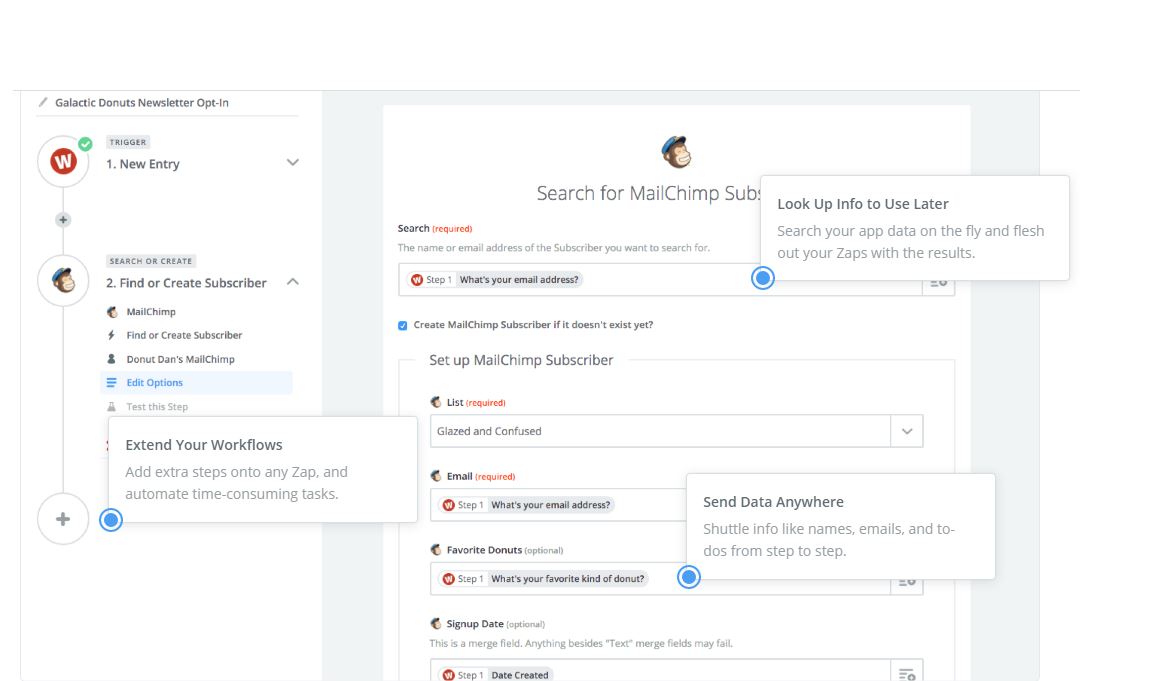
In addition to the aforementioned triggers and actions, the system also uses searches. All three elements are used by the Magento 2 iPaaS system to establish connections between different platforms. Triggers are used to watch for events in applications. As for searches, they look for specific information, and actions push the system towards creating new items. Thus, most daily needs may be completed automatically, while you spend time performing more important tasks.
Over than 750 applications are already available for integration. It seems that Zapier connects more apps than other iPaaS solutions, and new options are added on a weekly basis. Slack, Facebook Lead Ads, Quickbooks, various Google services, multiple ecommerce platforms (including Magento 2), and many more are at your disposal.
And due to an intuitive and user-friendly editor even a child can create a fully automated workflow. No developer help of coding knowledge are necessary.
As for Magento 2 (Zapier was among the first Magento 2 iPaaS systems), the cloud automation service offers the following ways to improve your daily routine:
- You can create an automated workflow that generates a Trello card every time a new order is placed;
- Each new order may be posted to HipChat;
- A new customers may be added to ActiveCampaign as a new contact;
- An email alert may be sent for each new order;
- A new shipment may be added to a Google spreadsheet.
And these are some popular integrations:
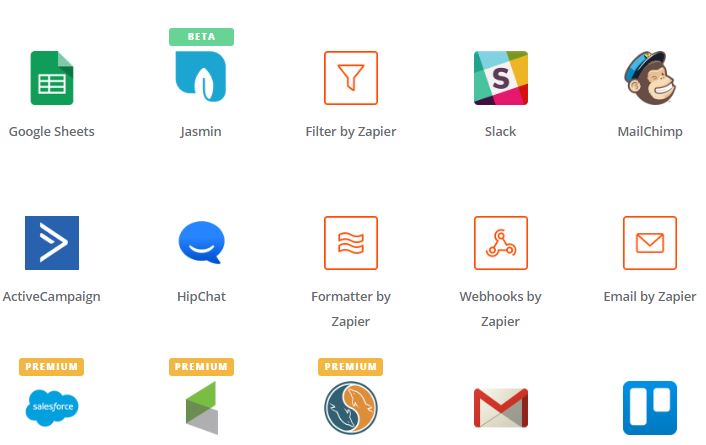
Turn on your imagination to fully leverage the Magento 2 iPaaS technology. The opportunities are almost endless. Get more inspiration here:
The most important thing about Zapier is that you can use it for free. Automation starter kit is provided out of charge, so you can grab the tools and do everything you wish. As for paid plans, they start at $20 per month.
PieSync
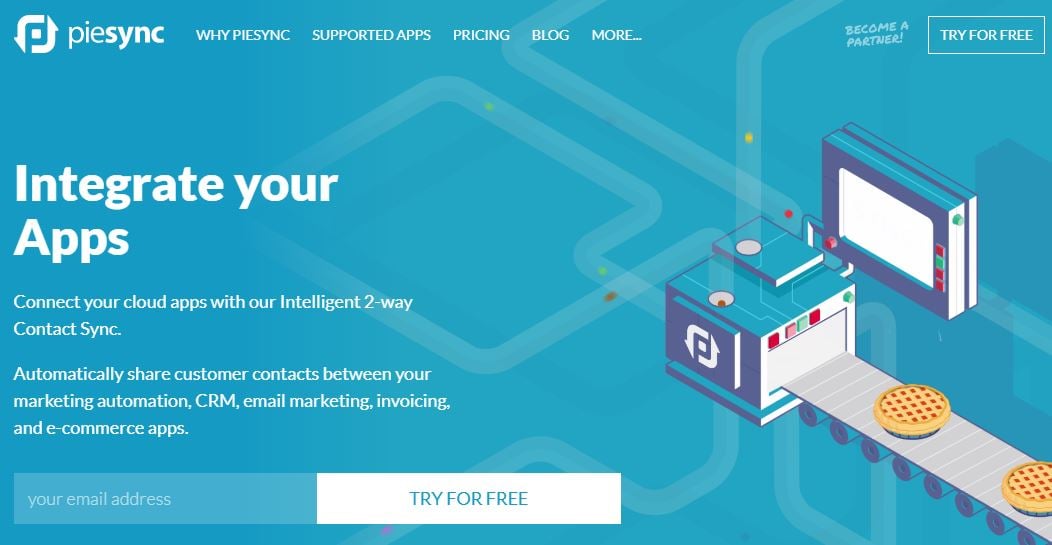
PieSync offers Intelligent 2-way Contact Synchronisation. The service is designed to share customer contacts between various services including marketing automation tools, CRMs, emailing platforms, invoicing systems, and ecommerce applications. If you only need to move contacts between multiple parts of your business automatically, PieSync is a perfect online automation service that covers your needs. If more complex automation is necessary, pay attention to other iPaaS solutions.
Since more than a half of businesses are using cloud applications, cloud automation is extremely important. It not only helps to save time, but also allows reducing human errors and provides absolutely new features that positively affects every business. With an average of 13 applications per business, such services as PieSync gain more attention from day to day.
The platform is based on the Intelligent 2-way synchronisation that consolidates customer contacts from multiple apps. As a result, you get a 360° view of all clients.
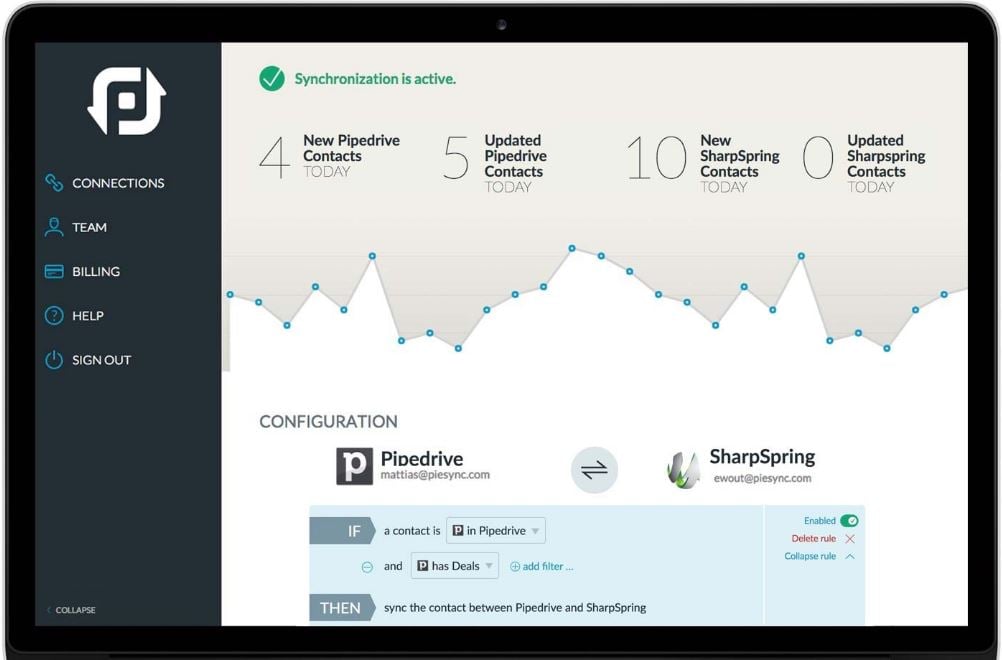
To make your team more productive, PieSync allows saving up to 25 hours per month by synchronizing customer contacts automatically. You only need to connect all your business apps to the system. And by keeping your data up to date, you can increase profit or at least not to lose it due to outdated contact information.
PieSync provides syncing solutions for businesses of all sizes. And there is always an opportunity for scaling. So if you start using the platform as a small Magento 2 store and become a huge market player within the next few years, there is no need to be afraid of limited capabilities: your business growth won’t affect the productivity of PieSync.
And of course, the platform allows you to synchronise Magento contacts with other applications. Thus, every time a new contact is added or an existing one is updated, PieSync automatically synchronise it with the other connected applications. Furthermore, the platform works in the opposite direction: if a contact is updated outside Magento, the appropriate information is sent to your ecommerce website as well.
Plans start from $19 per month which is a relatively low price.
Cloudpipes
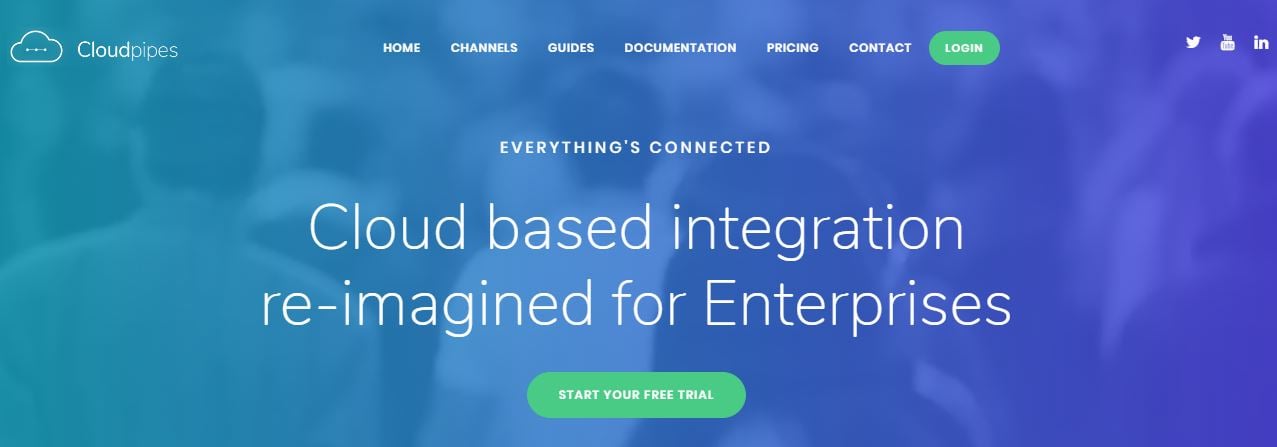
Cloudpipes introduces automated cloud based integrations for enterprises. Create workflows and get your business running fully automated. The Cloudpipes iPaaS offers the ability to implement a set of business workflows that are not available in Magento 2 by default or consume lots of time requiring various manual operations to be performed.
Instead of doing everything manually, you can fully rely on Cloudpipes that permanently synchronises records without the overhead keeping them always updated between multiple instances.
With the help of mapping, you can connect absolutely different systems together. The powerful semantic mapping functionality is added to understand the differences in naming and representation of the same data entity across different systems simplifying the integration.
Furthermore, the iPaaS platform offers a lightweight, on-premise agent that makes hybrid integration secure and simple. Secure connection occurs between applications both deployed on premise and in the cloud. The system offers pre-built connectors for various popular APIs, including FTP, HTTP, ODBC, OData, LDAP, and Active Directory. They are not only powerful and extensive, but also don’t require programming skills enabling elastic performance scaling.
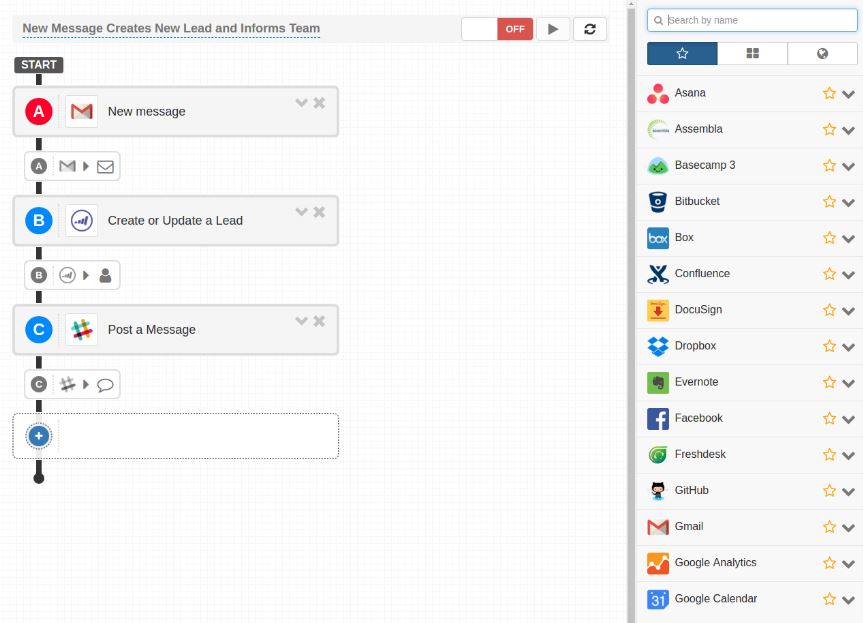
Other important features are:
- Fault tolerance;
- End-to-end security;
- Guaranteed data integrity.
Everything is built into the platform satisfying enterprise requirements with a single offering.
Besides, you get more than 150 application channels to choose from. Cloudpipes offers unique support for such platforms as Broadsoft, HubSpot, G Suite, Eloqua, ServiceNow, etc. And you can freely connect everything to Magento.
While working with customers, the Cloudpipes iPaaS offers two triggers: Customer Created and Customer Updated. Next, you get the ability to perform such actions as Create Customer, Update Customer, Delete Customer, Fetch a Linked Customer, or Look Up Customer. Besides, the platform allows launching a query – Search Customers.
In case of orders, triggers are Order Created and Order Updated; actions – Fetch a Linked Order and Look Up Order; query – Search Orders.
The Cloudpipes Magento 2 iPaaS allows you to integrate your store with these services:
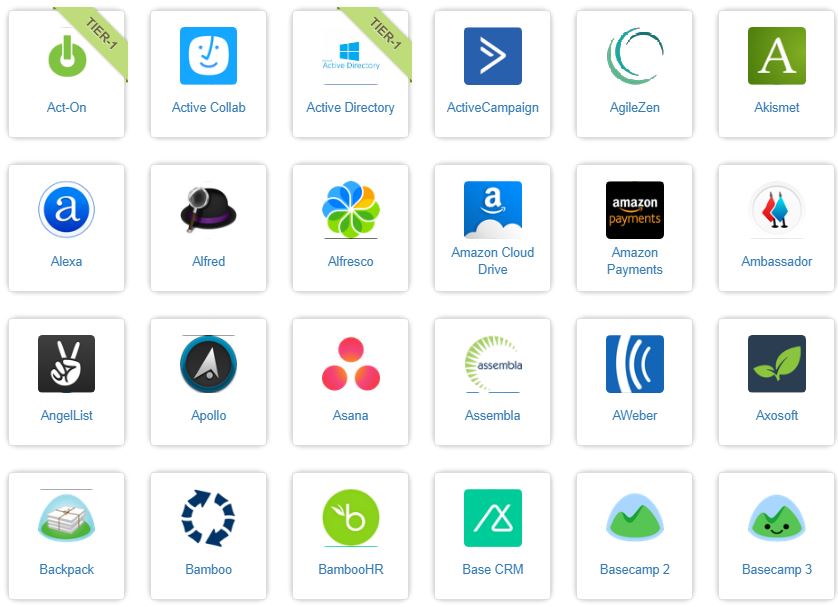
You can discover more platforms here:
The cheapest plan provided by this Magento 2 iPaaS system starts from $495 per month.
Skyvia
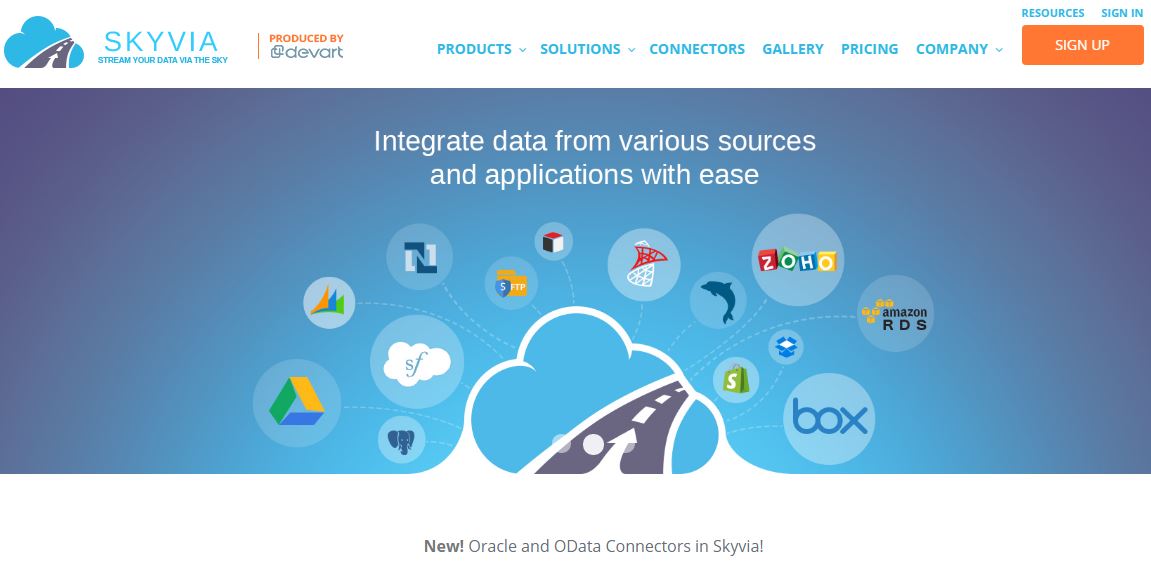
With Skyvia, you will be able to integrate, backup, access, and manage your ecommerce data via the cloud. The iPaaS system provides lots of useful integration tools developed to connect your business to various third-party platforms with neither coding nor special knowledge. Skyvia supports data import, export, migration, and synchronization.
Besides, you will always keep your data safe with daily backups which are fully automated. Alternatively, you can run anytime manual backups. The backed up data is always accessible, so you can monitor all changes, and restore the original conditions within just a few clicks.
SQL data management is also among the benefits of Skyvia. You can seamlessly query your data from web browser via a visual query builder. Alternatively, it is possible to use SQL. Such query results as grids or charts that can be visualized (if necessary). Next, you can export them as well as modify before export right in the data source.
It is also necessary to mention that Skyvia lets you connect various data sources (BI, mobile, office apps) to your Magento 2 website via a unified interface. Thus, the iPaaS system eliminates the necessity to master various interfaces and API’s. You can also move data right from Magento synchronizing it with various databases and clouds. Powerful mapping settings make these connections simple and precise.
Skyvia lets you connect the Magento 2 website to Salesforce, Zoho CRM, NetSuite, MailChimp, BigCommerce and Shopify, Oracle, MySQL, Amazon RDS, etc. Many more services are listed on the Skyvia official website.
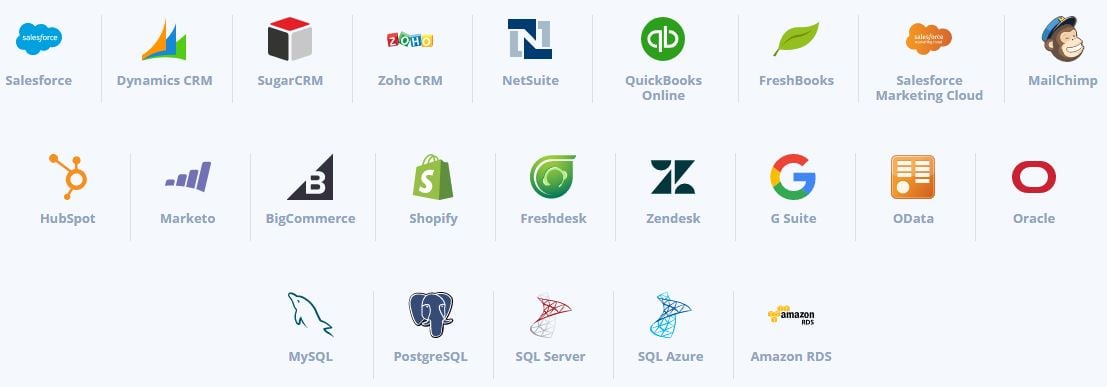
CSV import/export functionality for Magento 2 is also possible with this Magento 2 iPaaS system. You can load files either from your computer or from a file storage. Multiple CSV files import is supported as well. At the same time, you can import one file to multiple sources. Mapping is available at this stage as well. Skyvia supports CSV import/export from/to: FTP and SFTP, Google Drive, Dropbox, Box, OneDrive, Amazon S3, and Azure File Storage. Alternatively, you can create your own connection.
Additionally, the Magento 2 Skyvia iPaaS offers replication. It is possible to replicate your data to MySQL, Oracle, PostgreSQL, SQL Server and Azure, Amazon RDS and Redshift, Google BigQuery, etc.
And due to a robust backup system, you can save your Magento 2 storefront from human errors, account hijacking, or bad third-party applications. A backup can be configured in less than a minute and restored in a few clicks.
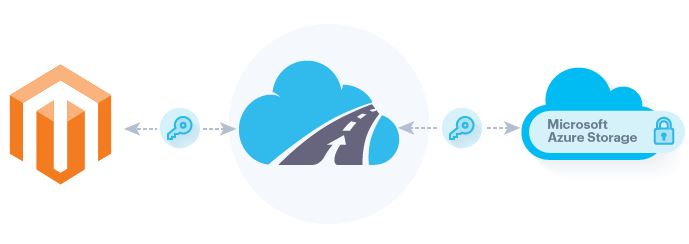
There is also a Skyvia Query tool designed to leverage the power of SQL while you manage Magento data. The editor allows selecting, inserting, updating, and deleting data.
To feel the benefit of Skyvia over other services, you don’t need to pay anything, since there is a free plan. A basic plan starts from $13 per month.
Workato

The Workato iPaas system will help you integrate everything into your ecommerce storefront: cloud and ground applications, databases, APIs, etc. With the help of automation tools, you will provide your digital workers with superpowers. For instance, there are AI-powered chatbots that deliver relevant info and better workflows. Note that the platform incorporates machine learning that creates better integrations every time you manage a new connection. The auto scaling feature is always on providing you with instant deployment without DevOps. To make the system even more reliable, Workato uses fully automated error repair in addition to rollback with zero data loss. So your precise information will be always saved and restored within a few clicks in case of a collapse.
As for the number of connectors, it is really huge – more that 1000. You can freely use them to connect your Magento 2 store to cloud and on-premise applications, databases, APIs, and files. Furthermore, connectors remove duplicates automatically as well as deliver data in the right sequence and guarantee delivery of events.
Right now, you can run the following integrations:
- Salesforce
- NetSuite
- Oracle E-Business Suite
- SQL Server
- MySQL
- SFTP
- HTTP
- On-prem files
- Slack
- Box
- Airbrake
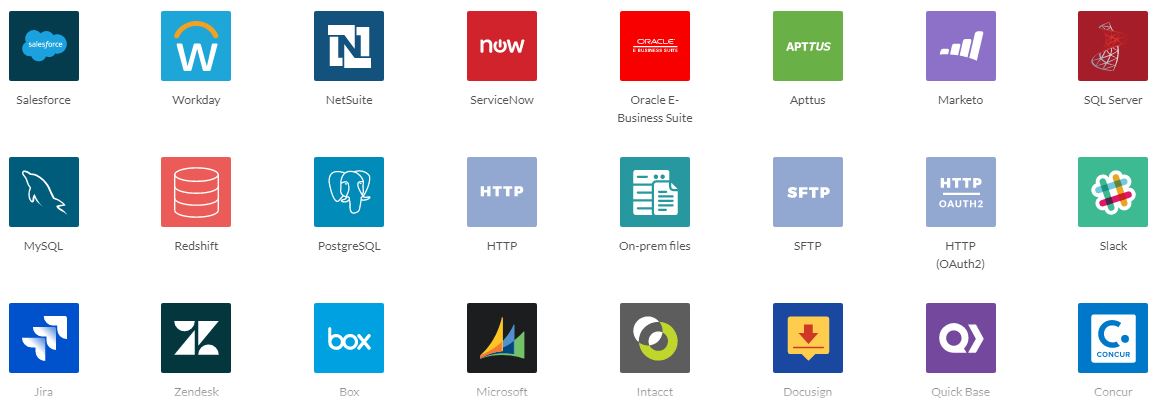
More connectors are listed here:
To get more out of your Magento 2 store, Workato allows connecting it with various applications and automating different routine tasks. Furthermore, there is a huge community of users, who create connections and share them with others. Such connections are called recipes – a connection between two apps made of a trigger and an action or several.
Workato Magento 2 iPaaS supports the following triggers:
- New or updated customer;
- New or updated product;
- New invoice;
- New purchase order.
As for actions, they include custom HTTP actions, customer creation, product update/creation, “Get customer/order by ID”, Search customer/order/product.
Magento 2 Vend Integration via Workato:
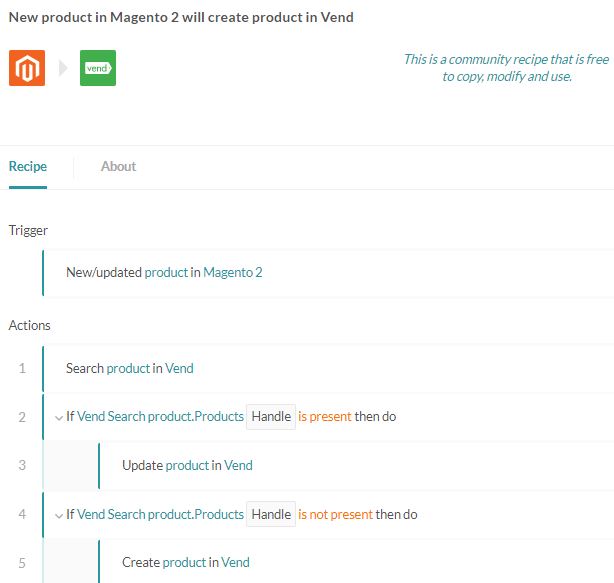
The Workato Magento 2 online automation platform allows you to combine the aforementioned triggers and actions in order to automate time-consuming routine processes. For any further information, follow this link:
As for price, the cheapest plan starts from $599/month, but you can try Workato for free.
OneSaaS
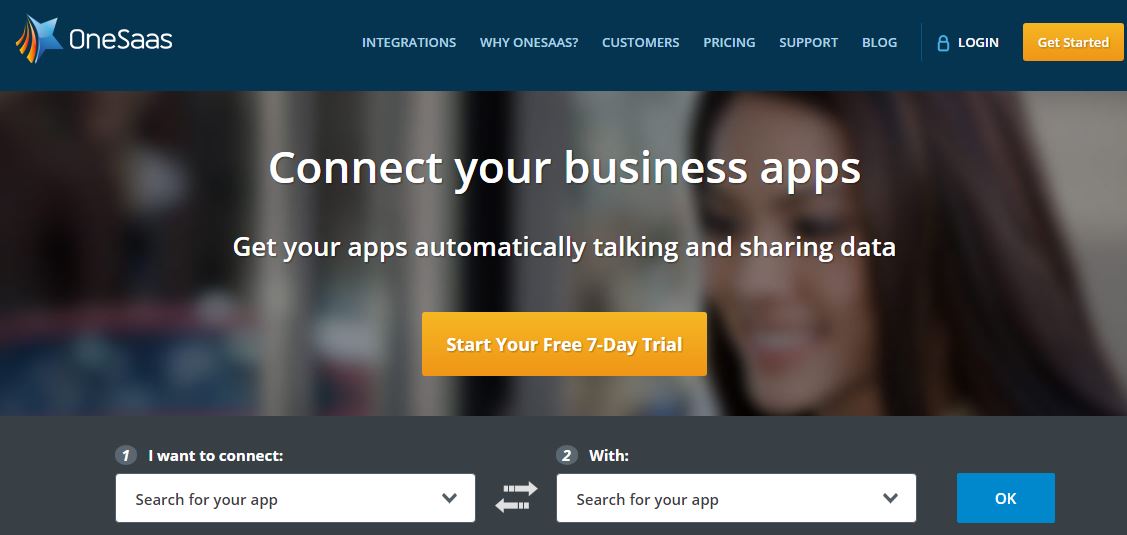
Don’t miss the possibility to combine your business applications within one robust system with OneSaaS. This iPaaS solution will help you get all apps talking and sharing data automatically. And since there are several pricing plans, even the smallest enterprises can afford OneSaaS. But let’s return to the functionality of the platform.
The OneSaaS iPaaS is designed to share data between popular ecommerce, accounting, fulfillment, billing & invoicing, CRM, and email marketing applications. The process is fully automated, so you not only save time, but, as in case of other similar platforms, decrease the number of human errors within your business. Since better data means you’ll get a more comfortable business workflow and consequently make better business decisions, automation is a must. Note that the setup of OneSaaS takes just a few minutes and there is no need to write code – everything is already available in a user friendly interface.
It is possible to integrate Magento with other business applications as well (otherwise we wouldn’t mention this service in our digest). OneSaaS supports all Magento versions from 1.5. Magento 2 is supported as well!
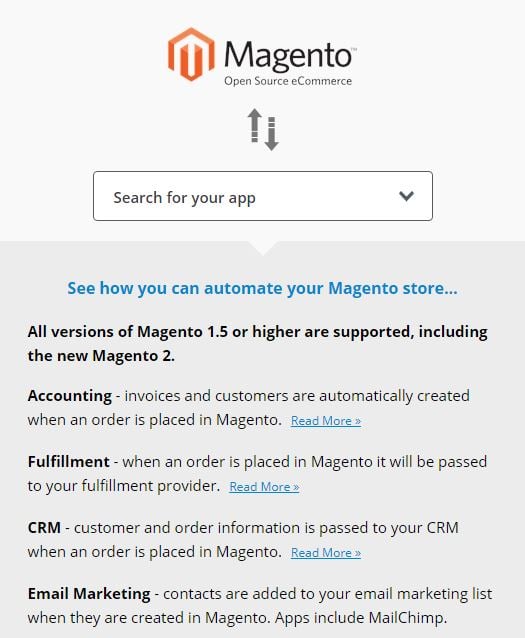
You can easily automate the process of invoice creation. Invoices can be created automatically, triggered by a new order. The same is about customers: when a new order is places, the customer data is used to register a new customer.
You can automate fulfillment as well. When a new order is placed in Magento, the OneSaaS Magento 2 iPaaS passes it to your fulfillment provider. The same is about customer and order information that is passed to your CRM.
And of course you can automate some aspects of email marketing. When contacts are created in Magento, they are automatically added to your email marketing list. Thus, the iPaaS introduces the new way you interact with MailChimp and other similar services.
The cheapest plan starts from $29 per month. It fully covers the needs of small businesses that use just a few business apps.
Final Words
These were the most reliable Magento 2 iPaaS services and Magento 2 online automation platforms. As you can see, they have the same goal, but different realisation. Besides, prices differs a lot. If you need a free Magento 2 iPaaS, you can simply get one (Cent IO). If an enterprise level solution is the only thing that can satisfy your business goals, it’s no longer a problem to chose a corresponding service. Which one is the best? Which one would you recommend to use? Please, leave your thoughts in comments.





